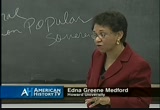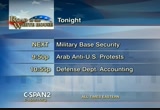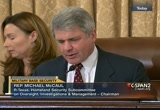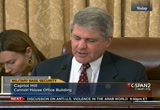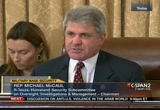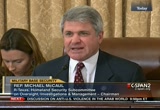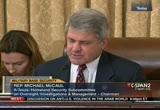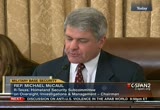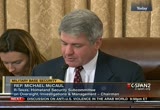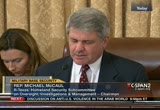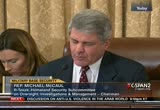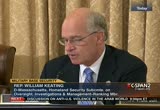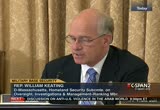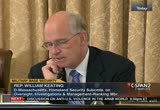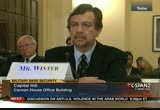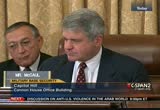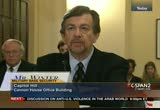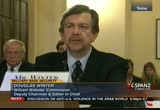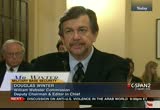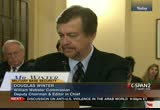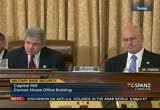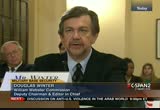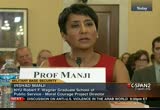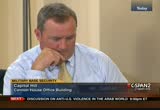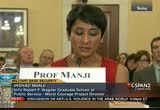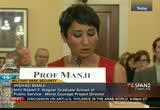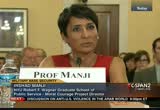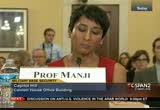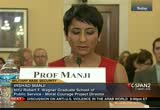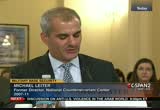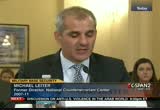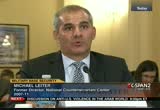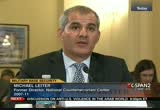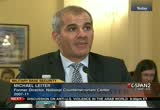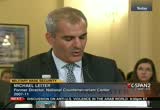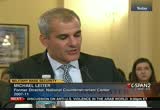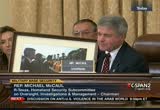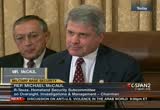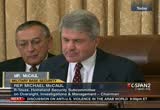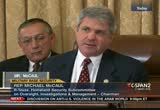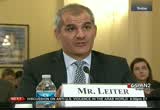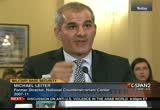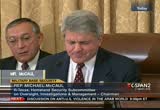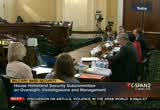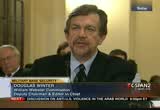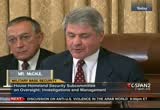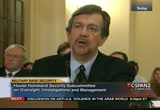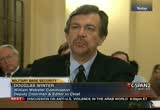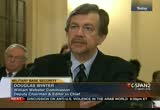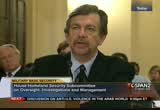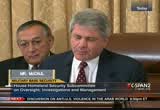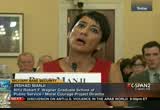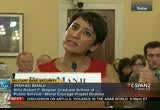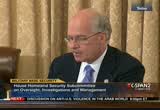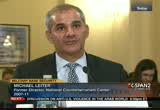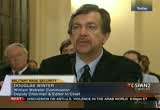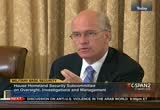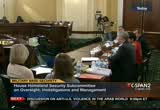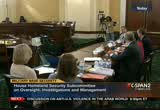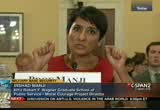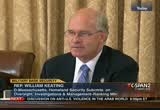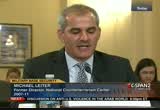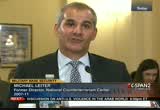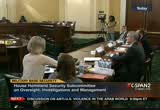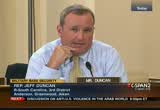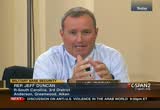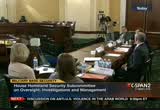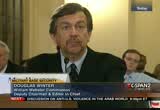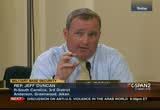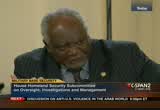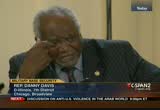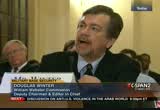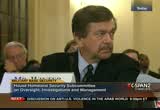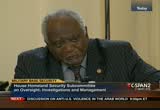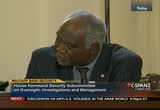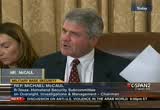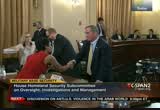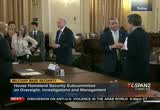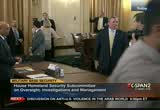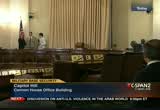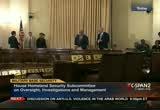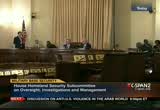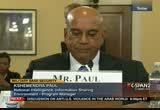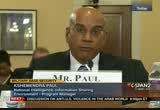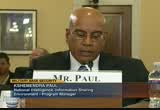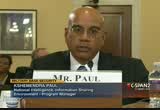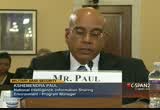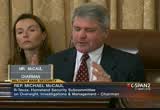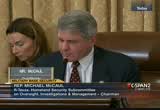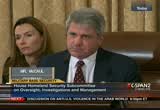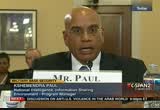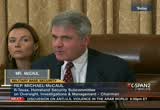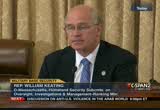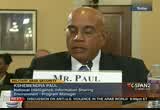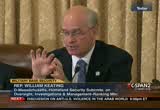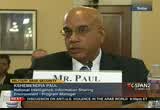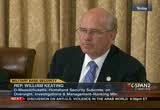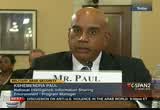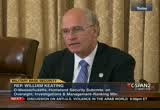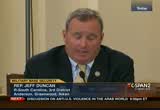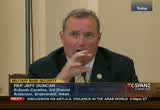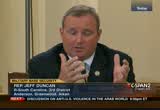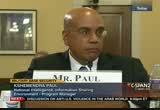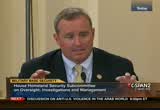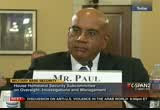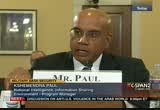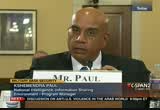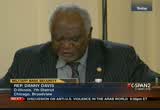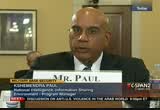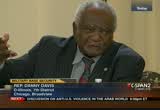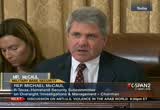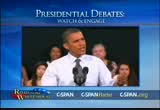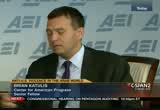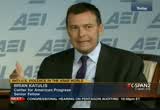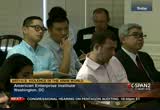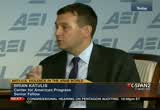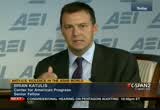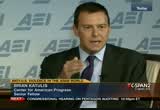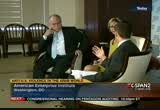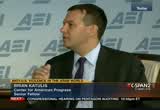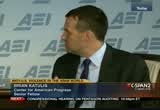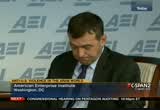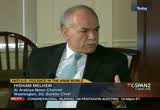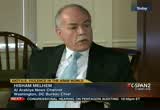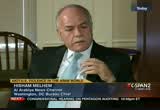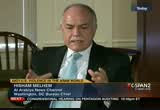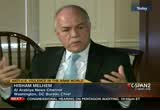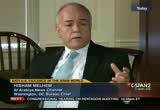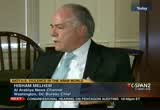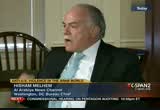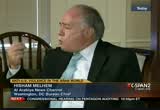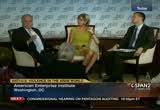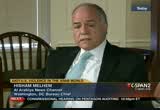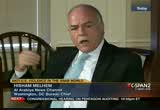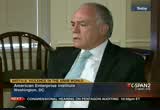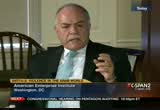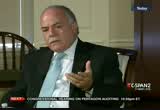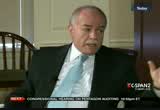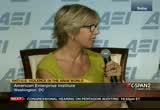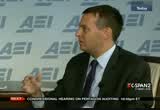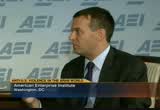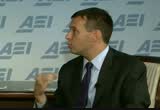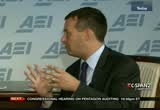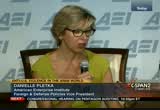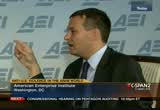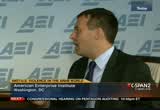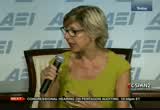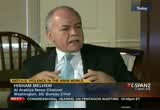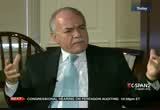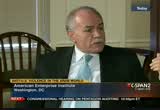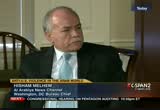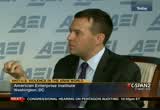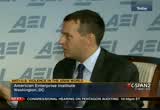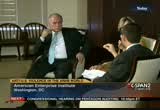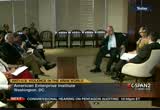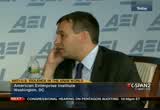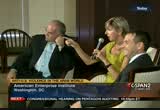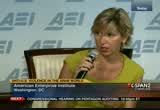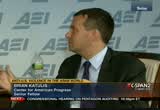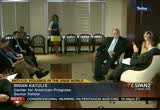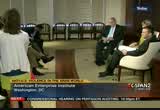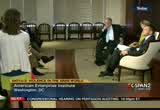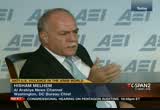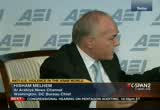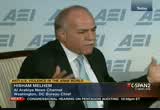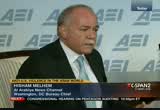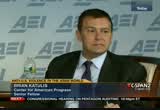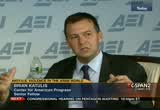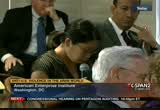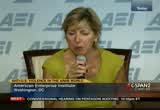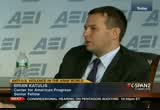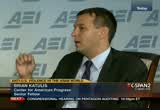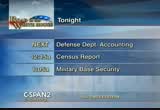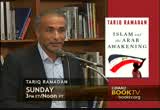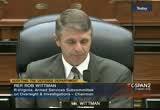tv Tonight From Washington CSPAN September 14, 2012 8:00pm-11:00pm EDT
8:00 pm
where the union army has a foothold, slavery still exists in those areas. >> president lincoln issued an early years version of the emancipation proclamation. at the authors and historians including harrold and james talk your questions on the battle a repurr cushion of the single bloodiest day of flighting in history. live on c-span 3. in less than three weeks the first of the presidential debates. watch and engage. tonight on c-span two, a house hearing on security at u.s. military bases. a panel at the american imbrices substitute discusses antiu.s. protest in arab countries and later a house armed service committee on the defense
8:01 pm
department accounting practices. the former directer of the national counter terrorism center michael liter testified at the house hearing on military based security peaked. he talked about new procedures for court terrorism investigations put in to place following the 2009 shootings at fort hood. this homeland security committee hearing is under an hour. [inaudible] [inaudible] the purpose of the hearing is to exam information sharing across relevant intelligence and law enforcement agencies specifically as it pertains to the report issued by the webster commission. which focused on the fort hood attack. it and i mention mr. winter let me alaw you for your great work, and mr. webster on the report. i now recognize myself for an opening statement. before we begin the hearing today we should pay direct to
8:02 pm
the brave diplomats who serve abroad. unfortunately one of the ambassador chris stevens and throw three of his colleagues were killed on tuesday the eleventh anniversary of the 9/11 attacks. it should remind every american that we are a nation under seize and must remain vigilant to do all we can to take action against terrorist the plots. whether it confronts us here in the united states or abroad. in june of 2009, fbi directer acknowledged the challenge facing the bureau stating, "it is not sufficient for us as an organization to respond to a terrorist attack after it has occurred. it is important for us as an organization to develop the intelligence to anticipate the terrorist attack developing intelligence, developing facts. and the past we looked at
8:03 pm
collecting facts for the courtroom. we now have to think of ourselves as gathering facts painting a picture of a particular threat understanding the risk and moving to reduce that risk. and i couldn't agree more with the directer's statement. and then on november 5, 2009, a gunman walked in the soldier readiness center at fort hood, texas and shouted the jihaddic term. and opened fire on unarmed soldiers and civilians. he killed 13 and wounded 43 42 others. was the most horrific terrorist attack on the u.s. soil since 9/11. today we will exam the facts of the fort hood case as we know them to better understand how these facts that seem so obviously alarming now were so missed by seasoned professionals and to understand how the fbi and intelligence community as a
8:04 pm
whole can benefit from the lessons learned from the tragedy at fort hood. the suspect and the fort hood shooting is major nadal. a commissioned officer in the united states army who openly communicatedded with the muslim clear gi and number two terrorist. he characterized himself as a soldier. and was assigned the task of counseling our soldiers from coming home from the battle field. let's stem back in time and exam the facts. on may 31st 2009 he said one of several e e-mails to al lack mack i can. in the e-mail read in part, i heard a speaker defending the suicide bombings is per admissible. he contends that suicide is permble in certain cases. one who purposely takes his own life but insìs the important
8:05 pm
issues are intelligence. he compare it is to an soldier who sneaks an enemy camp during dinner to prevent an attack known to be planned the following days. the suicide bombers intelligence is to kill numerous soldiers to prevent the attack to save the fellow people the following day. he is successful. his intelligence was to safe his people, his fellow soldiers and the strategy was to sacrifice his life. this logic seems to make sense to me. this e-mail telegraphs almost precisely what happened that fateful day. it was in the hand of the fbi before the attack. in another e-mail he asking please keep me in case you find me useful, and please fell free to call me collect. so in december of 2008 the fbi
8:06 pm
san diego field officer intercepted two e-mails. and i did identify the e-mail as product of interest. over the course of the next several months the san diego field office and the washington field office would exchange e-mails about how to aggressively investigate the lead. in june of 2009, washington sent the following e-mail to san diego, given the context of the military and medical research and the content of his unanswered e-mail messages, wfo does not currently assays him to be involved in terrorist aactivities. the fbi agent in san diego described washington's inquire -- the case was dropped. until november 5th when the media began circulating reports of the massacre. at that time, the san diego agents knew exactly who the
8:07 pm
perpetrator was saying, quote, you know who that is. that's our boy. years before the fbi knew of the nadal the army major was being noticed by the superiors and colleaguesed at walter reid where he was a residence in the -- two fellow officers described him as a quote ticking time bomb. during the medical residency and fellowship he demonstrated evidence of violent extremism on several okayses he presented sympathetic views toward a radical view and wrote papers defending bin laden. actions that are enraged the classmates and professor. no action was taken. instead he was rewarded for his work. his officers and evaluation
8:08 pm
reports state, quote, among the better disaster and psychiatry the uniform services university. he has keen interest in islam culture and faith as has shown cacht to psychology understanding of islamic nationalism and how it may relate to army interest in the middle east and asia. these officer vails reports were inaccurate. these were all flags. none of which were acted upon. so many flags in this case. these reports did not present the facts about the character in real, he was barely a competent psychiatrist. his really radical views alarmed his colleagues. it is a man who was to counsel
8:09 pm
our soldier coming back from the field of battle. in the case, both the fbi and dodd had important pieces to the puzzle that it put together maybe just could have possibly saved the lives of twelve soldiers and one civilian. i want to personally express my sympathy to those impacted by the terrorist attack at fort hood. we should treat those who died and wounded as a brave americans and award each of them a purple heart medal. when i spoke with the victim's family at the fort hood memorial service. i saw firsthand the outrage and loss they felt. and i wanted to help them find the answer. i want the answers to serve as a [inaudible] to affect change and improve the intelligence community as a whole so we can stop the attack before they occur. we have had great successes. we look forward to hearing from
8:10 pm
the,s testimony to better understand what went wrong in the case and how we can prevent such a tragedy from occurring in the future. with that, i now recognize the ranking member a gentleman from massachusetts mr. keeting. >> thank you, mr. chairman, as we pause to think of the families of the four americans in the mosque -- lost this week in libya and keep their families in our frairs and thoughts, it is significant that we come here today in dedication to find every piece of information we can find that will determine how better to keep the americans that serve us so well safe as they try to keep us safe. with that, mr. chairman, i thank you for holding today's hearing. three years ago, on november 5th, 2009, nation was shocked by the mass shooting that the occurred a the l army deployment
8:11 pm
center located at fort hood, texas. during the shooting 13 lives were lost. 43 individuals were wounded and the lives of so many others were forever changed. later became evident that the warning signs existed well before the tragedy and should have, at the minimum been further investigated. both the fbi, and the democrat of defense had knowledge of the potential as the threat to homeland security. the actions leading up to the mass cur by major nadal the soul suspect should be sparked a greater concern on the part of the officials. yet, dots were not connected. information not shared and the lack of formal policy and protocols lead to huge break down in communication. in december 2009 at the direction of the fbi -- exam the events that occurred before or after the shootings.
8:12 pm
the final report of the william h webster on the fbi and the event at fort hood texas which represent the work of the commission was released. it was realitiesed in july of 2012. the crucial recommendation mirrored in both the webster commission report and the 9/11 commission report focus order the importance of information sharing to our nation's security and the need to do away with a culture of territorial that existed defeat the various levels of federal, state, and local authorities. as a former massachusetts district attorney myself, i was at the bottom rung at the information sharing leader and understand the consequences and inned a quilt lines of communication. for this reason my first legislative measure was that signed in to law was an amendment to the intelligence authorization that encouraged federal authorities to utilize fusion center. that of the law enforcement to
8:13 pm
secure our homeland. since then, i have been following the progress of the recommendation set forth in the 9/11 commission, and now the webster commission in regard to intelligence sharing and i'm pleased that the administration is indicated that effective information sharing and access throughout the government is a top priority. this being said, i'm interested in hearing from the both witness panels today on their own thoughts and recommendation. with that i yield back the balance of my time. thank you, we're pleased to have a distinguished panel of witnesses here. we have doug los winter deputy chair and editor in chief. he's a counsel of for the law firm of brian cove. he's the head of the firm's electronic discovery unit. he served as a law clerk to judge william webster on the u.s. court of appeals also serve
8:14 pm
adds as captain in the u.s. army and graduate of the u.s. army judge advocate school. second we have pl's kshemendra -- for leadership and action. as directer she equips students to become global citizens to speaking truth in power their communities. as reformist muslim, she has written multiple books on the trends that are changing the world of islam and it's great to have you here today. thank you for being here today. and finally, my colleague in front from the department of justice mr. liter. a senior counsel to the chief executive officer of the volunteer technology and the former directer of the national counter terrorism center. it's great to have you.
8:15 pm
we recognize mr. winter for his testimony. i'm joined by the commissioner who was responsible as governing authority lee yai san and staff member dporg murphy. it is impossible in the time a lotted to describe the lengthy and detailed investigation that is set forth in the final report. directer mill miller's terms of reference is great. it's intimate and complex. there's no simple caucus of cause and effect here. the mistakes in shortcomings we identified were the products of cascading sets of circumstances that rains from a lack of policy guidance, training, and adequate technology to a misleading set of army personnel records in an
8:16 pm
era of interrupting bereavuation. my written statement sets forth an overview of the analysis and findings. todayly devote review of the rights to help underscore the lessons of fort hood. the fbi has concurred in the principles underlining each of the 18 recommendation in and in almost every instance is implementing a responsive measure. we are recommend that the fbi adopt seven policies to formalize fbi practices that were not followed in the assan thairt would help ensure the information sharing in similar circumstance. recommended policy concern the counter terrorism command and control hierarchy of the fbi. restrictions on counter terrorism leads assigned to joint terrorism task forces.
8:17 pm
-- when judge webster was sworn in as directer of the fbi there were three able siss at the fbi. today the fbi realize more than 3,000 intelligence able seis with the established career paths. we applauded the fbi success in embedding analysis greaght fusion cells and other analysis-driven people. we recommend further analysis in to fbi operational groups. a crucial lesson of fort hood is the ever changing diversity and compressionty of communication technology in the impact of the ever growing amount of electronic information on the fbi's ability to identify an combat terrorism. these change the ways in which the fbi will in the future need to acquire store review, manage, and act on intention.
8:18 pm
we are recommended that the fbi expedite and seek expanded funding for imbrices data management programs with the emphasis [inaudible] separate service for applications and developing shared solutions across the u.s. intelligence community. we recommended that the fbi seek funding for accusation of new hardware for the dwtems d.a. base system which lacks the infrastructure to fulfill system demands and lacks a live disaster recovery back up. only two people in fbi agent and analyst were charged reviewing information in the investigation. the criewshing volume of information they confronted the limited technology, and other factors forced those two people to review the 18 iowa san communications in a d.a. to day
8:19 pm
context with 20,000 other items of electronic information they reviewed. we recommend that the fbi evaluate and acquire information technology that was automated and advances and assist personnel in managing data. we recommend that the fbi implement manage information review property calls for these deep of large data collection that would allow for case specific review of the type that our can in the investigation as well as strategic review by different review teams. an important reminder of fort hood is that congress, the justice department and the fbi must assure that the fbi governing authority strike and appropriate balance between protecting privacy interest and deterring threats like those posed here. we recommended that among other things that the fbi should increase compliance reviews and audit and the existing governing authority should remain in effect. training we learned is crucial. particularly in the task force
8:20 pm
context where you have a diverse number of federal, state, and local and triable agencies. the dcsi agent that conducted the field office did not know that the dwsedm is d.a. base existed leaving him in turn the fbi supervisor to believe that the were there only two communications between assan and alackey. we recommend that the fbi [inaudible] before they join terrorist and task force. in closing, i want to know that the final report focuses on what went wrong. throughout our investigation we were witnessed to all that was right about the fbi. we saw pate rofm, professionalism, dedication and long hours of work in a context of constant threats and limited resources. agents analysts and task force officers are confronted can the decision twigses every day who have consequences of life oar
8:21 pm
death. they need better policy guidance to know what is experted, better technology, resources and training to navigate the ever expanding flow of information intelligence information. they deserve our gratitude. thank you. >> thank you, mr. winter. we recognize the professor for her testimony. >> thank you. good morning. my i'm here in the capacity as founder and directer of the modeler courage project. before i formally begin, allow me also to express my sympathy to those both american and not who have been victimized by this week's violence in libya, egypt, and now yemen. housed in the wagner school of public service, the moral courage project teaches people worldwide to speak up when others frankly, want to shut
8:22 pm
them up. we are motivated not just to break silences but also to combat the abuse of power. in other words, the corruption that comes from the fear of speaking out. this means understanding why silence develop in the first place. which brings me to the question that concerns our hearing. let me be clear, i do not know if one or more fbi officers intentionally withheld information about major nadal. but personal experiences leave know skeptical about whether the standard barerers of national security are willing to share vital information whether with the public, or with the each other. i will give you a couple of examples in a moment.
8:23 pm
first let me address why i have personal experiences on this front. and the reason is i'm a devoted muslim who loves god. and because i love god, i speak up whenever anybody uses islam to violate all of our god-given liberties and human rights. as ref few goes we settled on the west coast of canada, and there i grew up attending two types of school. the multiracial, multifaith public school, and then every saturday for several hours at the stretch, the islamic religious school. at the religious school, i asked candid questions, for instance, why can't muslims take jews and christians as friends? at the age of 14, having asked
8:24 pm
one too many of these questions, i got booted out of the school. as i had i've had to assure my mortified mother more than once, leaving the religious school does not mean leaving the religion. i decided to study islam on my own and discovered that there is an islamic tradition of questioning. of reinterpreting and even of defending with the collarrics. it is this tradition that empowers me to reconcile my faith with freedom. it put mes on the end of death threats not just in the muslim majority countries but also in this part of the world. that is why i have firsthand experience of the inner workers
8:25 pm
of national security. that is how i have come to observe the censorship that playings many good people, people whom we owe gratitude and has a mission to protect the public. in the remaining time i'd like to share two stories. although the first takes place in can can, of which i remain a citizens, it's forshadows the second place which takes place in the united states where i now live and work. in june of 2006, canadian police arrested young muslims for plotting to blow up parliament and behead the prime minister. the trorn tow 17 called their campaign operation bother. bader. operation badder is a transcribe biewd to the battle of bader.
8:26 pm
the first decisive military victory by the profit mohamed. now police knew that religious idolism helped inspire the toronto 17. still, at the press briefing to announce the arrests, police did not mention the words muslim, or islam. at their second meetings with the press, police boosted bragged about avoiding the words muslim and islam. again, knowing that operation bader had been organized in the name of islam. three months later, at the police conference i raised my concern about the silence, after my plea for honesty several law enforcemented inners independent of each other confided to me that the lawyers prevented these
8:27 pm
authorities from publicly utter the words muslim and islam. as for my experiences in the united states, here's a concrete one. in 2009, i received media calls about david, a u.s. citizens who helped plan the terrorist attacks on bombay in 2008. in other words, the year before. apparently, he had named me among the targets too. journalists wants to know how that made me feel. you can guess my response. what made me feel worse though was that the media calls came in a full day before any national security officials got in touch. somehow somewhere their chain of
8:28 pm
communication had broken down. the research on institutional fie lows and silence suggests multiple forces at play. but the antidote to -- the willing tons speak up when others want to shut you down. i thank you for the invitation, and unlike my teacher, i welcome your questions. >> thank you. we appreciate your courage. thank you for being here. the chair recognizes mr. leiter. >> ranking member, it's a pleasure to be back. it's my first appearance before the congress outside of the executive branch. i have to say the freedom is invigorating. today i'm actually appearing as a member of the homeland security project at "battleship" pots center. that's the organization to the 9/11 commission lead by the very
8:29 pm
distinguished and talented governor tom king and lee hampton. my comments are based on my time over four years, the head of the national counselor terrorism center as well as serving in the navy and the department of justice. rather than spending my five minutes now going over extensively where i think improvements have been made. i'd like to focus most of my comments where i think there are still challenges that the congress and the executive branch faces over the next several years. but i do want to highlight, because you're focused on a failure, congressman, you obviously noted the success and there have been many. and many of the these discussions we take for granted today. the fact we have a single con sol state of the national court terrorism center. the fact we have analysts and information system in one place. the fact we have 104 joint terrorism task forces. none of this to say that the problems are solved, this is to
8:30 pm
say that the improvements are tremendous. and the tragedy of the 13 brave americans who were lost in fort hood can never be eliminated. all of thatting that being said, we have avoided large scale terrorist attacks in the united states and a total of 14 individuals have been killed in the united states in the past 11 years, is my view nothing short of remarkable. traj iic that every life was lost. that the congress and the u.s. government and the allies can be proud of that. having accepted that not everything is right, i would offer two caveats before go in to the areas where i think they can be improve pched first i think the congress and the executive branch must be careful not to con flat all information sharing problems as being the same. there is real san sophistication in this. what happened on christmas day in an intelligence failure was one type of information
8:31 pm
challenge. and it's it's a very different challenge than what happened at fort hood. i think it's important to get under the hood, exam these with some [inaudible] second, i think this committee knows this well but we have to continue to remember that information sharing is not always an mitigated good. we need look no farther than wick i can licks to remember as we share information we must do it in a way that protects privacy and civil liberties and protects the security of the information. i believe the two things can be reconciled we can cannot forget there are dangers as well. very quickly, where do i see opportunities and need for improvement in and i'll divide it in to five basic areas. legal, policy, budgetary, personnel, and technology. first, on the legal front. i am a recovered lawyer, but i will say there is probably no
8:32 pm
area in which i worked in national security where the legal landscape is myriad of complicated conflicting statutes. and extremely difficult to ever now how information cannot be shared and the tabored puts on operationers and analysts and lawyers is tremendous. although i think the foreign intelligence surveillance act serves valuable purpose for collection and protection of civil liberty. anything the congress can do to simplify the law in an everrer raff rapidly changing technology would be important. second, on the policy front. i think it is important that the congress and the executive branch work together to move legal policies -- pardon me, move information sharing policy in a for a more rapid way than they move today. i think as a general matter, i say it having served in a
8:33 pm
republican and democratic administration, as a general matter, administrations have gotten the policy right about how information should be shared. but the pace at which the discussions occur borders on the biblical. and in an era of rapidly evolving terrorist threats, we cannot allow the discussions to go on endlessly. the congress must demand that the executive branch rapidly adopt policies like the attorney general guidelines to ensure there's effective information sharing once laws are passed. on the budgetary front, this committee knows quite well the pressures that all of national security will face in the coming year. we have spend ton of money to build up everything. in my view, these have done well as we enter a more austere budgetary period. the congress will have to look closely how we can racialize and great a system and not a
8:34 pm
patchwork of enemy. very quickly on the last two points. personnel and technology, i think part of the failure was a they are row understanding among some well intentioned eats and officers about what the signs and symptoms of the pop lace lags. it must be continued and training on toolgts people have must be engraced. last but not least, technology can help us here. we all know that technology is not a pen see ya. basic technology tools which flag information for people allow uncorrelated information to be shown to a variety tiff individuals, information to be shared across sheerly regimes among the fbi department, defense, and alike it is critical. it's not two agents looking the e-mail to decide whether or not individuals radicalize. we take full advantage of the
8:35 pm
committee. i welcome your questions. it is good to be back. i want to close on joining of you on your notes of condolences on the law lost in libya and the losses in fort hood and in afghanistan. >> thank you for being here again, i look forward to hearing answers to my questions we're open format under the constraint of the federal government on top of you. so with that, i'd like to enter in to the record a statement from the honorable william webster the chair of the webster commission. hering no objection, so order. >> i want to show this is taking the day of the me memorial service at fort hood. i was standing here. you can see the boots, the rifles, the hem met gives you
8:36 pm
agraphic picture of what really happened that day. you can see the soldiers on crutches. i asked them, what did he say when he shot you? congressman, he said, -- god is great. the classic jihaddic terminology. at that moment, i realizationed that this was not a workplace violence incident. this was something more. that this was in fact an act of terrorism. i was criticized at the time for saying that. i think history will judge that as correct assessment of what happened on that fateful day. i want to start with you, you were head of the ntcc. you were the expert at connecting the dots. it did perform a mastful job while you were there. you we worked with joint
8:37 pm
terrorism task forces. they have an enormous amount of data that comes through and you miss one thread of evidence you be held accountable by members of congress at the later hearing. but these e-mails 18 e-mails that took place when we were briefed by senior intelligence officials and they wouldn't give us the content they would simply say, the only word i can using is down play. the significance of the e-mails. finally when the god work of the webster report revealed the e-mails publicly we had a chance to actually read the content and the one that i described in the opening statement may 31, 2009, major assan almost seems to be telegraphing exactly what he's getting ready to do. almost asking for permission in yemen, is it okay for a suicide womanner to kill soldiers and nenlt civilians in the cause? to protect our fellow brothers?
8:38 pm
you know, you and i worked in law enforcement. this is one of 18. the other one, you know, keeping me under a roll the joint terrorism task force thought wow. there's something wrong going on here. we need a history cam -- send a lead to wfo the response from wfo is astounding that while we don't see a terrorist threat here, and they basically shut down this investigation until five months later when major assan kills 13 people, 12 soldiers. there is a department of defense official on the joint terrorism task force and yet that official didn't contact fort hood. maybe it's the legal
8:39 pm
restrictions that you're talking about, if so, we need to change that. there were so many flag not only between the fbi and two officers. i commend the san diego office for their courage and bravery of trying to get to the bottom of this i fault the wfo office for not following up on this. and in the military, the way they pass this guy along knowing he's [inaudible] they don't want to deal with the problem? they pass him along. promote. send them to fort hood. so -- so many flags in the case. how could the dots were identified but they weren't shared. how did this happen? congressman, i will say that i agree with you, it did not take
8:40 pm
long from my perspective to know it's an act of terrorism. the national counter terrorism center within the week of the event entered it in to the worldwide data base of terrorist events. based on the reports and it was not a conclusive legal judgment but the indications were that it was terrorism. i think in terms of the information that was not shared, you center a break down along so many different angles. san diego team ding a good job. ly refer to mr. winterer who knows the details better than i. they were not aware of the e-mails. they were not aware of the department of defense information. they were not aware much of that. it was handed to an officer who from an outside's perspective didn't have a strong understanding of the science of radicalluation. the points i make in defense of how this evolved with is one we did have to put ourself back in
8:41 pm
2009 to recall who was then versus who he is speer perceived today. in 2012 we understand him to be an operational leader in tboin we did not. it's not an excuse, it is some color. the second piece is from my perspective, congressman, the idea that people would not go talk to him. i do not understands and i do believe that if that information were shared with a broader group who understand really -- there would have been increased pressuring from headquarter to make it happen. it would have lead to, i believe a better outcome. >> i agree more i talked to the commander office of fort hood. he would have liked to know this. i understand the shake down. they could have at least watched him. put him under surveillance. maybe it would have stopped what
8:42 pm
happened in my town. i want to go to mr. winter. 18 e-mails wfo only has two e-mails. some technology break down occurs they're not awire. they can't access. they didn't know how to access to get the remaining e-mails. with that said, you were a former justice official like myself the may 31 e-mail, if you read this, would it concern you? >> gosh, with i look at one e-mail and the look of the body of the e-mails. they are clear indicators of a individual has been radical. that's a hard call. >> when he's asking for permission to perform a suicide bombing mission against soldier and civilian at the dinner to protect his fellow. >> that's what i said, i want want to somebody to interview the go. >> i think that's what should have happened in the case. what happened here?
8:43 pm
>> the decision made in wto were u based on [inaudible] a set of circumstance. >> your microphone. >> sorry. >> i'm sorry. >> better? >> yes. >> the decisions made at wfo were the result of truly a cascading set of circumstance. san diego set the lead based on the first two e-mails that were acquired from assan to mall lack i can. there was no fbi policy on the assignment of these types of leads or on taking action on these types of lead. the supervisor in wfo waited fifty days after the arrival of the lead to tread and to assign. he assigned it to a dcif agent that was a task force officer. he waited ninety days from then to read it and to act on it. under informal fbi practice, agents had ninety days to work
8:44 pm
on leads. either to elevate them in to an investigation or close them down. so this agent read that lead and acted on it on the last day under that fbi practice. and indeed conducted the assessment in four hours on that day. so it was rushed. it was that pressure that was created by their workload, and these late assignments. he consultedded u.s. army electronic personnel fileson major hay san that was the entirety as what he could have access to from the jttf. that meant he received a brief and highly misleading set of personnel records that indicated that major had a security clearance, he had been promoted major ten days earlier, and his supervisors praised him they are thoroughly.
8:45 pm
8:46 pm
trained on the database and he didn't even know it existed. he believed after searching fbi database that there were only two e-mails that were sent in december 2008 and january 2009 which was five months prior and awlaki had not responded. based on that he concluded and his supervisor concluded that hasan was not involved in quote terrorist activity. now, did that resolve a question of whether not hasan was a threat? we didn't believe so. we felt this decision-making process was flawed and that they should have considered and conducted the interview of tasonne based solely on the information they had at that time but i'm not defending the decision. i'm explaining it. you can understand how reasonably these men could have been led down this path by a combination of all the circumstances some of which were
8:47 pm
self-imposed and others which were the result of a lack of policies and others the result of an inability to gain access to those records at walter reed for example. >> i think those problems need to be fixed but i will ask you this question. i believe gross errors were made in this matter that resulted in 13 people being killed, all soldiers. should anybody be held accountable within the federal government? we were specifically asked by a doctor of mueller to assess whether any disciplinary action should be taken against any of the personnel involved. we found mistakes were made but we found these individuals acted with good intent. they acted mostly reasonably under the circumstances and they were not individually responsible for some of the decisions that occurred because of a lack of policy for example. one of the reasons we advocated
8:48 pm
the seven policies we recommended was that if those policies had been in place and similar procedures, then actions like this would violate them and individuals would be directly responsible and subject to dismissal. >> is it your understanding these policies are in place now? >> almost all of the policies are in place. some of them are being coordinated into a single policy. the command-and-control for example. spew my time is running short but the san diego office called the response that we don't want to damage his stellar career and something to the effect that this is a particularly sensitive matter. that was not corroborated by the wfo office. >> the first part did you discuss is corroborated, the wfo advised san diego twice that they did not leave an interview
8:49 pm
of hasan was appropriate because it would damage him in terms of his position in the military. the chain of command would not take it lightly. i do think the american people and their family and the victims deserve that somebody in this government be held accountable for what happened. professor want to ask you real briefly in my limited time left, you spoke very eloquently of your experience of a the fear of speaking out. within the department of defense, you know we have this individual that various of his colleagues are seeing the warning signs popping up. they call it a ticking timebomb. he is proselytizing radical islam -- islam. so many indicators were there and no one wants to speak out. there is a fear of retribution with the army and he is just sort of passed along. is this a case where political
8:50 pm
correctness was more important or overshadowed by national security? >> it sure sounds like that to congressmen and frankly i think it would be fair to ask if political correctness also crept into the fbi. for example we spent the last several minutes talking about how somebody at the san diego office of the fbi had a troubling week, pass it onto on to the washington field office after which it went nowhere. and one of the questions i have as i'm listening to these other testimonies is why did the san diego officer not stand up when it became clear to him or her that and obviously unsettling
8:51 pm
lead was not going to be acted upon. now, when can argue that while it's obvious why people don't stand up in general because doing so invites complication in their life. but this is where i believe we can actually learn something about a mechanism that the department of state has put into place and that is a mechanism called the defendant channel. it was actually introduced just after the vietnam war, whereby the foreign-policy officer, when they see that the chain of command is going to be resisting, they are groupthink and with a subtle consensus that has been accepted too long within the cozy confines of that department, they can actually use this defense channel to explain why somebody higher up
8:52 pm
needs to hear a counterargument and they do not have to get permission from their higher-ups in order to be heard through this channel. i don't think that exists either at the department of defense or at the fbi that is something well worth investigating. whether it works as it did by the way and the lead-up to the yugoslav balkan genocide and it was what was the reason because at the time secretary of state eagleburger heard a dissenting voice through that channel and realized that the united states must intervene. it was through that, i think we can learn a little bit more about how dissent can be institutionalized so that it is constructive rather than chaotic. speier have an excellent point in the chair now recognizes the ranking member. >> thank you mr. chairman and
8:53 pm
you have done a good job at looking historically at this. i want to look at this from a different angle and maybe ask the first. i've heard about the policies and i've heard about some of the changes. could this under the same set of circumstances happened today? >> congressmen you would end up with a slightly dead of -- different set of facts that wouldn't get the policies he put in place but i think -- >> in the circumstances. >> i think it's -- the more it looks like this circumstance the less likely is going to occur because of something like this fall through the cracks? absolutely. i still believe there is information that is not being shared effectively and quite often that information is about u.s. persons which is appropriately the most protected set of information and the congress and the executive branch must ensure that information is effectively
8:54 pm
shared and as the professor very ably said you can get second and third opinions and you aren't simply forced to take the views of one operator or one analysts about whether or not someone is a threat. >> mr. winter could do still happen today? >> absolutely and i agree with mr. lighter the closer the circumstances that less likely it is to happen because of policy changes and because of the higher sensitivity to these types of issues. for example however two of our recommendations concern the fbi putting into place a clearinghouse process which it currently has the dod by which advises dod through headquarters and the national joint terrorism task force about investigations of dod personnel in the military. we recommend it at similar clearinghouse procedures be adopted for law enforcement agencies whose members may have equal if not greater access to
8:55 pm
intelligence and military members and also has two other departments of the federal government so that if someone at the state department is under investigation there is a mechanism in place for the investigating officers to move that up not only of the fbi but also move it to the state department chain of command and their investigators so all the individuals can work together to detect and deferred -- deterred, excuse me for potential the potential for terrorism. however, obviously outside of government hierarchies, the possibilities for individuals like major hassad to take these kinds of actions exist and it is difficult for the fbi to have constant knowledge of the whereabouts of those types of individuals. >> one thing that i was going to ask this and i've asked it with general mccaffrey before, that
8:56 pm
initial information whether state or local officials, how is that inhibited by comprehensive immigration policies in the state of people see things and people want to come forward? how are they going to come forward if they are going to effectively make themselves criminals? >> that is something that is beyond my pay grade, sir. i would answer in the station. via ei has in place what is known as an e. card in system which is known as an electronic version of its guardian system by which individuals who bring information to local law enforcement agencies like even anonymously, tips and the like can't be forwarded on immediately and promptly by electronic means and acted on by fbi agent reviewers and analysts i should say within a very short. mac timed. >> congressman? i think interaction with
8:57 pm
immigrant communities is critical and in the counterterrorism context that is what we are most focused on is the american-muslim community which may or may not be immigrant communities that engagement by the fbi in the department of homeland security, immigration and a wide range of agencies and state and local officials with american-muslim communities is absolutely critical not just for law enforcement intelligence but for good government engagement and i will say congress has an important role in that regard, that when the fbi does engage in these muslim communities, that they are not immediately second-guessed about which muslim state talks to. it is very important for them to have white engagement to understand these communities and potentially identified if they have been radicalized in my view of the cars has to give the executive branch a reasonable room to maneuver and to do that engagement to find problem areas. >> may i add something of my
8:58 pm
own? >> briefly, yes. >> course engagement with communities of all kinds is necessary for good governance. the problem is that too often, especially in this country, we stumble over ourselves to try to identify who are the moderates and who are the extremists and i would argue to you gentlemen that this is the wrong distinction. the better distinction to make if you want to really get at the heart of the matter is who are the moderates and two are the reformist? the moderates for example don't much differ from extremists in that moderates are so consumed with what they perceive to be western imperialism, israel, america and so forth, that they have distracted themselves from dealing with the realism within their communities. those clerics, those men and even the supposedly sick where civil leaders who insist that
8:59 pm
good muslims remain silent when crimes such as honor killings happen. and so we need to ensure that we get the framing here right if you are actually going to hear people who are willing to step forward that they are not going to be willing to step forward congressmen and less they know that you have got their backs because they know what backlash is coming their way by virtue of having -- >> thank you. i just want to get back to the process. one of the things that concerns me is because we here at all the time in this committee in particular in different shapes and forms that you use the word the necessity of having a national system versus a patchwork system. to me you can have the greatest information in the world coming forth. if we don't have a way to process that, a national basis. can you talk more specific about what you meant when he said that? i mean how far along, dhs is a
9:00 pm
patchwork and it's amazing. to me, that has to get fixed first. i know we have budgetary issues in front of us but that is not fixed and that's not a priority what good is all this gathering of information? what good is that? when you said that, i think that is a priority we have to have and what budgetary issues are confronting that and what actual technology issues or interaction issues with different levels of intelligence? expand on that. >> congressmen absolutely and we obviously as you and the chairman know well as attorneys we live in a very separated system with hundreds of millions of dollars. that information is being collected at the local level and to some extent shared with the department of homeland security and the fbi and jjt aspect of
9:01 pm
what we have not done is created a system where you can actually effectively compare that information across state and local and jttf. the fbi took a very valuable step in the last year which is to move towards a regional eye structure because i don't believe you can have any system with 104 jttf and 50 plus execution centers and see correlation so regionalized intelligence structure where you have six or eight regions that are looking at the various state and local fusion centers at jttf in seeing where they're a suspicious activity and where there is -- and having those cases managed by the fbi headquarters. that in coordination with dhs, that starts to look like a system and as you see that information shared within the federal family of the national terrorism center, homeland security specializing on borders
9:02 pm
and using their collection resources and i.c.e. and customs and border protection you start to understand how you can close these gaps and as you so eloquently stated the beginning of your questions, try to avoid this from happening in the future. as budgets go down we -- but the technology exists today to make sure that some of those less understandable correlations are seen both at the state level and the local level and ultimately the federal level for some of these cases. >> well mass quick question. would you say that is among the top priorities right there in hit and having that occur? >> yes. >> i totally agree. that was the first of our recommendations to the fbi, enterprise data management. >> thank you very much. >> thank you ranking member. the gentleman from south carolina's recognized.
9:03 pm
>> thank you mr. chairman and thanks for this very timely hearing. the state department had warnings at least 48 hours in advance of the 9/11 attacks that happened this week. yet they did not go in lock down certain embassies where the threats for and the reason i say that is a lot of times we are given very very clear signals staring us in the face and we fail to act on those or many times we leaned back on political correct this as professor manji pointed out that religious symbolism, they didn't even want to discuss the real ideology behind certain terrorist attacks. the fact that we have here in america taken fort hood as a case of workplace violence but yet we will call what happens in
9:04 pm
wisconsin an act of domestic terrorism. i am all arms and really raise awareness here on this committee of some of the things that i hear going on within our pentagon and within the military where servicemen and women are discouraged from pointing out things that they see such is what happened at fort hood with soa on the card and just signals that are very clear for people that are going through their daily routine that should raise a red flag for us. but yet they are scared they are going to be labeled and i think when we have hearings within this committee addressing fort hood or addressing the radicalization of muslim youth and an address of islam is more of an address of an ideology that is really encouraging folks that practice islam as a religion to embrace a certain set of ideals and ideological
9:05 pm
values that lean more towards the attacks that we see and i think that is what happened and major hasan was caught up in that bed as americans we cannot be afraid to speak out and i want to thank the professor for having the courage, the moral courage to speak about those differences and that is what i've heard today about the difference between islam and your practice of islamic religion but also the fact, and there are some folks that do practice that religion who have gone in another direction in another part of their life and their political ideology and what their world vision is, so one thing i want to ask all of you is following the findings and recommendations of the webster report on the fort hood attacks, how would you categorize the attack that occurred at fort hood? >> we discuss this question at
9:06 pm
length and i speak for the commission in our unanimous view and our view was that we saw evidence that we did not have the opportunity to investigate on a criminal basis as the u.s. military is doing. >> let me ask this question a different way. work place, workforce violence or domestic terrorism? >> of oath of those characterizations, we refuse to reach a finding on that and i have to say the reason is that we don't have the evidence if vision to know in the don't know what kind of standridge the department of defense is applying and certainly their investigation was not into department of defense activities and it was not into the criminal investigation itself which was to a great degree hands off to us because the military is pursuing the criminal case against major hasan so we were unable to reach a decision on those issues. we do believe and really would
9:07 pm
like to see justice done for the victims, their families. >> professor manji? >> domestic terrorism, homegrown. >> mr. leiter co? >> mr. -- an act of international terrorism under our statute that we use, it was a sub governmental group, political violence. we called a terrace and then and in and we call it terrorism today. >> i want to refer back to the chairman's opening statement. the men and woman at that ceremony, the ones who are wanted in that attack, the families of the victims of that attack will tell you that this was an act of domestic terrorism and the war against terrorism. i think we as americans need to set aside federal correctness and really be able to discuss the real threats, existential
9:08 pm
threats to our way of life and with that mr. chairman i yield back. >> the gentleman from illinois, mr. davis, is recognized. >> thank you very much mr. chairman and i certainly want to thank the witnesses for their participation and especially for their insights in their answers. i was thinking that you now we can always know what happened, because we have the information. it's obviously far more difficult to determine why it happened or that causes that may have generated or caused it to take place. mr. winter let me ask you if i could, you indicated that policies are bad investigators
9:09 pm
and agents have 90 days to work on leave, and that sometimes individuals have more calls for activity band time or there is not enough kirsanow or there are so many leaves until trying to follow up on all of them. are there thresholds that will jump out at you? i mean if you are reviewing tips and information and allegations that a person can just kind of see that this appears to be over the line and we need to try and check it out as quickly as we
9:10 pm
can? >> there is a significant amount of training on many different levels on how to deal with tips, information and intelligence of different kinds. here at the san diego agency recognizes the messages and deserves some form of action. under sba policies that existed they could set what was called a routine discretionary action leave because it was not, there was no indication eminent that something required a 24-hour or 48 hour response. it could be resolved through the ordinary course of business. also wfo would exercise its discretion on how to handle a lead. the 90-day period method was in existence was an informal fbi practice at that time. we of course recommended that the fbi established periods within which leads must be acted upon. the fbi in turn has also eliminated these discretionary actions leads and has required
9:11 pm
action on all leads that are set out from other offices. >> let me, each one of you, do you think that we do as well as we possibly could in making an assessment of individuals when they are going to be placed in certain kinds of positions relative to evaluation as people seek employment, as people take assignments and have access to some kind of opportunity? do we assess their personalities or do we glean enough information where it gives the comfort level in terms of where they are and what they might be doing? >> congressman i will answer on two pieces. first i think we all interview
9:12 pm
someone, give them a job and a glowing recommendation and then they come and work for you in the performance is overblown. it's a pretty broad problem and obviously the manifestation in this situation is absolutely tragic. the second piece though more specific to terrorism is the fbi does have an incredibly difficult job of distinguishing those people who are radicalized and have radicalized views and those that become mobilized and actually take terrorist action. again that is why you want to interview them and try to make that some nation but frankly if the fbi, they couldn't watch every quote unquote radicalize. making that determination is very hard before the fact it looks very very easy after the tragedy. >> people who might seek to
9:13 pm
become members of the fbi, to be in a position to carry out their ultimate aim and all i am seeking is an opinion. i know that it's tough trying to deal with motivation all of the time. i mean we could answer that we would be in very good shape. >> congressman if you will allow me when quick intervention. i have written exactly about this question. what to ask in order to conclude within the muslim communities of this country where people stand on the continuum of reform, moderation, extremism and i would be very pleased to submit to the committee just the questions i recommend you ask.
9:14 pm
>> thank you very much. >> it i think the gentleman and just let me close by first thanking you for the excellent testimony and i do think and i agree with you mr. leiter that the fbi and jttf have an enormous challenge. so much information is coming through with this one thread and you're held accountable. this case though i think is a little different. you have got a major on that days in fort hood who is talking to a cleric, who there is some evidence that maybe had ties to the 9/11 hijackers for god sakes than he is rising in statue -- stature to becoming number one 11 in the world next to bin laden and unfortunately wfo only gets two e-mails and they don't get the may 31 e-mail that clearly outlined what he is planning to do. you are right professor, san
9:15 pm
diego, they have dod employees on these task forces. why didn't one of those that please contact fort hood? why didn't anyone contact fort hood and in safety and know what? you have got a problem. you have got a guy who could actually kill somebody, you know? and i don't think any of you really have the answer to that and i don't have the answer to that. let's just and fortunate that it happened in this case so with that gentleman we thank you for your brilliant insight and your excellent testimony and i will dismiss this panel and go on to panel to. thank you.
9:16 pm
9:17 pm
9:19 pm
9:21 pm
>> the witness will be on a separate panel all by himself, but let me introduce mr. kshemendra paul, the program manager for the information sharing environment at the office of the director of national intelligence. as program manager mr. paul has governmentwide authority to plan and receive the buildout and managed use of information sharing environment. he also co-chairs the white house's information sharing and access to inter-agency policy committee. the chair now recognizes him for his testimony. speech airman mccaul, ranking member keating distinguish members of the committee thank you for inviting me to testify today. my name is kshemendra paul. i'm the program manager for the information sharing environment.
9:22 pm
my training and profession i'm an information technologist. formerly i was the chief architect in the federal government. my office works with mission partners, federal, state, local, tribal, private sector and internationally. together our focus is on the improvement of management, discovery, using, sharing, delivery of and collaboration around terrorist related information. the role of my office is planning oversight and management. we span a variety of communities, law enforcement, homeland security, events foreign affairs and intelligence. as my office and our partners continued to implement responsible information sharing practices we reflect on the progress we have made across the nation as well as recognizing work remains. in january, director clapper
9:23 pm
spoke of the national responsibility to share information. he encapsulated our fission. he said and i quote, the right data anytime anyplace usable by any authorized recipient preventable only by law and policy and not technology protected by a comprehensive regime of accountability. this week we marked the 11th anniversary of the 9/11 terrorist attacks. the national security committee has achieved numerous successes that pertain to my office. these include improving interoperability of unclassified networks, enhancing the capabilities of the fusion centers, the state and local fusion centers, expanding the mission application and the impact of a nationwide suspicious activity reporting initiative, strengthening industry and government adoption of our interoperability framework including the national information exchange model.
9:24 pm
and finally integrating our nonfederal stakeholders in particular state and local law-enforcement into the national policy conversation through the inter-agency policy committee that you mentioned. but we are not without challenges. these include the continuously evolving threat environment, the tsunami of data faced by our mission partners and the constrained fiscal environment. my office continues to contain partners and lead efforts to responsible information sharing innovation. this is a journey. the evolution of the threats against us, the integration of our resources, and the efficient use of technology require constant vigilance and leadership. the threats to our safety did not stop that jurisdictional agency boundaries. are our information shouldn't be there. three core ideas of the drivers of the mission at i office, we are grounded by an enduring purpose to advance responsible information sharing to further the counterterrorism and
9:25 pm
homeland security missions. we are focused on responsible information sharing to enable decisions to prevent harm to the american people and finally we are building capacity to responsible information sharing across their mission partners at all levels of government. we are also strengthening protections for privacy, civil rights and civil liberties. this work makes x. stronger. let me elaborate. every fusion center in our country has a privacy policy as comprehensive as presidential privacy at outlines. the bold are the same position and we are well underway to finishing the job here in washington. this means one citizen sees something and say something, when police officers submit reports to fusion centers and joint terrorism task forces and one analyst worked to connect the dots the work proceeds across agencies and levels of government in a standardized and efficient manner that handles information appropriately and responsibly.
9:26 pm
gaps, challenges and opportunities for improvement exists. we have traction and clear compelling value proposition and away forward to continue to accelerate responsible information sharing. you have our comprehensive annual report and for the record is located on our web site ise.gov. in summary and believe there is no higher priority than the nexus between national security and public safety than responsible information sharing. on a personal note today, as we talk about the attacks at fort hood and also reflect on recent events overseas, i just want to say that my thoughts and prayers go out to the victims and their families. mr. chairman, ranking member thank you for the opportunity to be here and i look forward to your questions. >> thank you mr. paul and tank you for recognizing the importance of information sharing, fusion centers. mr. keating, my ranking member, we both worked at fusion centers
9:27 pm
and sometimes they are given a bad name and i think privacy protection peace is important to preserving the integrity with the work that they are doing it to make sure privacy interests are protected. so with that, i again want to go back to what this hearing is all about and that is fort hood. now my question may go outside of your expertise or ability to comment, but again in this case, you had a huge breakdown in information sharing not only between the fbi itself but also with the department of defense. if you can speak to these issues i would like to know how to fix those. first you have got an agent sitting in wfo who sits on this matter for the maximum amount of time possible. he looks at the lead of the very last day and i understand the fbi is swamped. they have a lot on their plate
9:28 pm
that when you have a major at fort hood who is the subject matter, think that would take a little higher priority. they wait until the very last day and within four hours based upon two, e-mails because this analyst doesn't know how to access the database that would give him the other 18 are other 16 e-mails one of which as i mentioned previously telegraphed what he is getting ready to do. so you have got that break down and then finally within these task forces you have actually the department of defense representatives. why did either side, both from washington or san diego, and your opinion and maybe you can't speak to this, but why didn't one of those dod representatives on the jttf's contact for that and say you have a problem?
9:29 pm
>> commenting on the specific operational aspects of fort hood are a little bit outside of my -- but what i would like to come to our some of the comments discussed on the earlier panel related to this question, things like doing a better job with enterprise data management. there is a key recommendation coming out of the webster commission and the key focus of my office. there is a recognition that goes back to the 9/11 commission and a series on the marco foundation it's really the mandate for my office to enterprise data management so that we can get together all the different aspects of national public security to keep the american people safe. think about 800,000 police officers in this country, the bulk of law enforcement of state and local and 18,000 police departments. getting that together into coherent architecture requires a focus on common processes and
9:30 pm
policies. we have had success with that actually. i mentioned in my opening comments about the national exchange model. that originated with state and local law-enforcement. it's actually the state and local intervention as a basis for data-sharing enterprise so the focus on knitting together these components into an architecture is the key. >> some of us worked on the fisa applications and i understand the restrictions and in this particular case with mr. awlaki. i think that may have had something to do as to why there has been so and prevention in the fisa world in so many restrictions, legal restrictionn counterproductive and may have gotten in the way of these department of defense employees or officials sharing this information with fort hood which is something the ranking member,
9:31 pm
i would like to look at jointly as to how if we have reform and order somehow just have some sort of reporting language that would clarify that can be shared. i can imagine why the federal government has this information within its hands and it can't share it with the united states army or the united states military on one of its bases. to me, that is just on in comprehensible so i thank you for your testimony and with that recognize the ranking member. >> thank you mr. chairman. mr. leiter, mr. winter has set although the chances would have been less like the in the circumstances in this tragedy at fort hood could indeed occur again today. can you reflect on your thinking, whether it could occur today and also what would you give for your recommendations?
9:32 pm
the greatest legacy we can give to you, family who have lost loved ones. i think the greatest legacy is that this wouldn't happen again to another american. could you comment on what you think in that regard? >> it's difficult to answer a hypothetical about the specific events about what occurred at fort hood. one of the things that we are successful on with this initiative is being able to bring together a lot of different voices across levels of government and outside the government to identify the process for doing suspicious activity reporting that addressed privacy civil liberties concerns but also operational effectiveness and through that process were able to identify 16 behaviors for preoperational criminal planning so that functional standard is in place nationally now and they are coming back to the question
9:33 pm
of the policy and things like that. when we started a lot of folks were concerned that we wouldn't be able to rationalize how folks looked at these kinds of issues because of the levels of government and the privacy issues but we were able to work through the successfully so i think there is a model there and i go back to bed to answer your question about what is the highest priority? from where i sit accelerating responsible information sharing practices is championed by my office is a real part of the answer in terms of dealing with enterprise data management issues or dealing with the jurisdictional issues, dealing with the cultural issues. i think just accelerating the work. >> the other thing that mr. leiter mentioned when we are talking about a patchwork system, he referred to having six regional areas perhaps that would be affected.
9:34 pm
what do you think it terms of that because i do think the more you have it under one roof so to speak, even though it might be a -- growth, the more that are there the better off we are and he was referencing up to six regional areas is sort as sort of a better step than we have now in this patchwork quilt. do you think that would be affected as well? >> you are dealing with getting the same message but the process by which it is reviewed and shared. the information sharing by statute is this -- distributed so the focus we have this on interoperability not just at the technical level. it's not about pipes and things like that. that's an important component but it's interoperability of the policy level in the business process level so we think it keyed to keep that focus on interoperability. the fbi approach on regionalization, that is a focus
9:35 pm
on coordinating federal activity which i think is a good thing and something we have heard from our state and local partners and it's something we are working through with the government structures. >> i will just ask you this. we had a hearing in houston actually and one of the things that came out of that was the need for the local police to be there and to be really one of the most important points in terms of information. i must tell you and this is my feeling, of all the areas, the higher governmental areas, the department of defense and fbi, i just don't see enough effort or enough success at the local level, the frontline where some of that information can be just a catalyst to spring the network of information that really will tell us something. what are your recommendations to really do a better job at the local level of having them be
9:36 pm
part of that information network and i know there are agencies that don't want to go down to that level. some of that information might be reached at the other side of that is without sharing that information at the local level, you can really lose probably the most important for made in that you could have in front of you and the most time-sensitive way. >> you know we have had some six with a national network fusion centers and they are increasing maturity. those efforts are led by dhs with close involvement with the fbi and doj and other federal agencies. i talked about the initiative before, 300,000 police officers in this country have been trained in the first time that i know of where these police officers have entered the same training. it was around the behaviors i mentioned earlier so there is success that way. is at risk right now because of the fiscal situation and this goes to to answer your question, when i talk about state and local stakeholders that comes
9:37 pm
back loud and clear and when you look across that landscape, 18,000 police departments 90% of which have 50 or fewer sworn officers there is concern about the smaller departments which make up the bulk of law-enforcement how to integrate them into the national architecture so a focus of our office and working with their stakeholders is to look at solutions like regionalization that is controlled by states or state-wide information sharing environments or co-locations. there's a there is a variety of different approaches and it talks about in the annual report for possible solutions like that to bring people together to become become for information infrastructure or a key part of dealing with this financial issue as well as knitting together the smaller departments in the national architecture. >> just to be clear the local stakeholders, they are saying that federal money can go to that kind of training and they would be more apt to participate and be part of this?
9:38 pm
from their vantage point? >> it's, when i talk to the state and local and the federal, there's a key focus on making sure as we have these investments today in the fusion centers and in other initiatives that we are looking at make in them as effective as possible by expanding the usage of them with the smaller agencies and also looking at over time other priorities, other priority threats that allow the case to be made more effectively for these men to develop support for them. >> think you and i yield back. >> the gentleman from south carolina. >> thank you mr. chairman and mr. paul thank you for your work. your vision and your goal for information sharing that will help prevent future attacks on this country and just help law enforcement in general are
9:39 pm
shared really so i thank you for the work and subsequent hearings or past hearings, we have talked with all the agencies, dhs and the state about information sharing between those agencies and some of the things that i've learned is that, and i will use the case of maybe a visa overstay and someone at dhs was looking into someone who may or may not have overstayed their visa and investigating the background that person has to come out of one database or system and actually log into another and come out of that system and actually log into another and i have even heard that an ms-dos type program or database is still being used in that, haven't even heard the word dawson so many years that it caught me by surprise but there are all password entry level so instead of having one password are are won by a system
9:40 pm
where one person could enter one time and get into all the databases that they need they are having to remember all the different passwords and that gets frustrating and they end up not doing a complete search as of the frustration level so i just share that with you because i think you need to know that and that is what i'm hearing from people that currently work in different levels of government. in your prepared statement you talk about the transformation of information ownership to information stewardship which i think that is a very valid point and do you believe we have reached that point of information stewardship and in my experience there are still holdouts today 11 years after 9/11 and three years after ford said, where folks refuse to partner or share their information and still consider they have ownership of that and they really don't want to share it for whatever reason, whether they hold themselves up to their superiors as the person in the know or the person that has the ability to move up in the ranks.
9:41 pm
we see that the private sector as well. how do we overcome that and are we overcoming that and what do you foresee in the future? >> thank you. that is the focus of the work of my office and i appreciate you mentioning the stewardship focus. it has taken us a long time and the government to develop the structures and the programmatic structures. we have lots of policies around information that is based on classes of information and it's specific to agencies or bureaus. the vision that i talked about is more focused on policy, round classes of decisions. it's a big job to look at the body of policy we have and how do we transition it to making decisions about information sharing and discoverability and things like that based on the classes of decisions. it requires technical
9:42 pm
infrastructure for the networks were identity management works across different organizations and across the levels of government where we have more consistency in how we implement policy and terms of the computer systems. this is a lot of work in a big journey in front of us. we have had successes. one that i will mention is related to the watch list that mr. leiter was talking about earlier. when somebody gets stop by state and local law enforcement and is on the watchlist we have a process now where that information gets back to local fusion centers in the joint terrorism task force in a timely manner. that is important to bring state and local law-enforcement into having that situational awareness into what's happening in their communities so there is more processes, more work to do but it's a valid point and it is where we are headed the stewardship. >> i see it as the first
9:43 pm
platform as long as those platforms are integrated to talk to the higher platform so that the higher up authorities have the ability to go to one platform and be able to google so to speak, to use that term, not necessarily that company but your name to find out everyone who had a decision-making level needs to know about. and so i applaud your work and i appreciate this committee and the questions that have been raised here and mr. chairman i really don't have anything else. >> the gentleman from illinois. >> thank you very much mr. chairman and thank you mr. paul for your testimony. government wide there have been challenges to the development of unclassified and classified systems, information sharing and
9:44 pm
in particular in dhs has had problems in the past developing and deploying these information sharing systems. let me ask you, how will the recent round of cuts to the budget impact the development of some of these systems and how can we make sure that they are developed and get to the state and local and tribal governments that need them? >> to cut specific to dhs, i do want to highlight that dhs hdm system has connectivity to the fusion centers and they have been may keep some stellar progress with the homeland security information network. we are also doing a lot of work
9:45 pm
to that drive interoperability across dhs's system and fpl -- fbi leo system and the intelligence community and also the grant funded state-owned risks cast so that is the coronation of the office to have interoperability and their philosophy is no wrong door. whether you're in a fusion center or working in a police department, law-enforcement you can get into the systems these systems and find the information. we have made progress but i don't want to overstate that. there's still a lot of work to do there. we do think that having consistent standards and architecture and working with industry to make sure we are not building systems and trying to interconnect them in a one-off manner, that kind of jury rig approach is not the right way. the right way is to have it persistent architecture that is used across these different systems empire state and local partners and work with industry
9:46 pm
standard organizations to make sure identity management is done in a consistent best practices way that we are implementing axis-based authorization in control. people can discover information so you know i think it's a challenge and we have made substantial process. i want to highlight the way to this progress is the fact that we have integrated our stakeholders and toward governance structures and we do that both in a variety of ways but in particular we focus on working with professional associations and that gives us a big ability to drive culture change because its bottoms-up inclusive. >> let me ask you, it's my understanding that the e. guardian system set up at the fbi is a major part of the national suspicious activity reporting initiative and it's
9:47 pm
the is the main way that state and local on a law enforcement on suspicious activities with the federal government. [inaudible] [inaudible] can you give an estimate of how many state and local law enforcement has led to federal counterterrorism investigations? ceases seditious activity reporting initiative is the foundation toward domestic counterterrorism at goodies and it critical integral part. there are approximately 20, maybe a little bit more and i can give you the precise numbers after the hearing, but in the suspicious activity reports vetted to the functional standards something on the order
9:48 pm
40,000 searches and what is called a shared the shared space and that is the electronic pool if you like that the fusion centers in the joint terrorism task forces and other participants use used to share this information. numerous cases have been opened by the fbi. i believe those numbers are -- so i would like to respond to the record and wait for those numbers. the eve guardian system is one of two technologies and the other is what is called shared space. they are interoperable and the important thing is they work within the functional standards and there is a common process for how the information flows. from citizenry from industry and resource sectors to local law enforcement, to the fusion centers in the joint terrorism task force shared for analytic purposes.
9:49 pm
>> i would expect that there would be some serious -- and the reporting of suspicious activity. >> there is a substantial number of investigations that are across this nation related to suspicious activity reporting either direct way out of the star system or starlike activity. it is foundational. >> thank you very much and i have no further questions. >> i think of -- think the general. mr. paul thank you for your testimony as well. i want to conclude by saying that we have representatives, the victims and their family members here today at this hearing. i think the federal government deserves, or should give an apology, a formal apology as to what happened and should call this what it actually was in the news, an act of terrorism and i do believe that the families of
9:50 pm
the victims need to be compensated adequately and given our deepest respect. as for this member of congress and this committee, you have my assurance that we will do everything we can to make sure that happens and so with that the hearing record will be open for 10 days and without objection this committee is adjourned.
9:51 pm
>> we can keep investing in wind ends solar and clean coal. construction workers can build homes and factories that waste less energy and retrofit old buildings putting them back toward. >> i'm going to take advantage of our oil, our coal, gas, nuclear and a renewables. america -- north america will be energy independent within eight years.
9:52 pm
>> today the american enterprise institute hosted a panel about violence and the u.s. demonstrations in several arab countries. this comes three days after the ambassador and three members of his staff were killed in an attack on the u.s. consulate in benghazi libya. this is an hour. >> good morning everybody. i am danielle pletka. i am the vice president for the foreign defense studies at the american enterprise institute. i'm delighted to have two good
9:53 pm
friends, think i can call you both good friends, join me this morning for a discussion of what has been going on in libya and what has been going on in egypt and more broadly about the middle east and where things are going. i am especially grateful to my colleagues for joining me and to you while here. let me introduce you to hisham melham to the bureau chief of al our be the -- el there are ybeth on the issues we are going to talk about today. brian katulis is a senior fellow for the center for american progress a fellow think-tank in washington and what we are going to do is try and follow a slightly different format. you can see that we are sitting a little bit more talkshow like and we are really going to try to have a conversation. i hope we will be able to involve you in that after we began a little bit but what i'm going to do is turn to my colleagues and just ask them to talk a little bit about what has been going on. the news this morning is that
9:54 pm
demonstrations are continuing throughout the region. we have finally gotten an apology from the president of egypt although it was long in coming. there have been four arrests made in libya and there is also a little bit of a political bureau going on in our country as there always is in an election year when everything, everything is political. so with that shortage of action i'm going to ask brian to start us off and talk a little bit about what you see going on and how really it impacts of your picture. >> thank you daniel and it's great to be back here in aei. i'm going to talk to my colleagues about returning the favor. i think most recently in tel aviv last year and hisham melham your intellect and your spirit who really is wonderful and you help us understand the complex region of the world. what i wanted to do is make three very brief points to
9:55 pm
truncate what i wanted to say and really we'll have a conversation here. first i wanted to offer a brief overview, a more clinical sort of strategic overview of where the region is right now because i think we get caught up and we have a tactical reactive crisis management type of state sometimes and we miss a strategy. second to offer couple of points on the next apps for the u.s. because they think we need to stay engaged as a leader in the middle east and third it little bit more in terms of broader strategic challenges and i will try to do it in two or three minutes but it may run up to five. first where are we? about 18 months in a little bit more into a transition that quite like they take years to go underway and i have been sort of disinclined against the labels of arab spring or awakenings or things like this because i think uprisings in some parts of the region are much more appropriate to try to be clinical here
9:56 pm
because out of the 19 or 20 countries in the middle east depending on what you count only six of them have seen substantial internal turmoil and for those that lead to leadership changes in egypt, tunisia, yemen and libya quite obviously so we are still very early on and we can talk about the different categories of the countries because the vast majority have not seen major change and i think sometimes we leave those to decide in the gulf region. second i think this transition will go on for a long time because of the demographics and economic political challenges. if you look at the generation coming to power in this region of the world and if you think this week is the old, expect more for the rest of this decade. we are in for a prolonged challenge here in the middle east. third, i think the change in the middle east will further contribute to this complex multipolarity competition within the region and maybe we can talk
9:57 pm
about this but it is already started before the uprising, the rights of turkey economically and politically. ii iran sort of iran sort of up and down more isolated these days, but quite complicated and these broad labels of shia versus sunni outlook there are some -- so the main assessment is my view very early stages of this process we need to buckle up. more of this is coming and what do we do about this? i think first despite region change u.s. interest remains quite the same. preserving the resources out of the region, preventing major wars particularly cross-border conflicts, countering terrorist forces in in the region stopping the spread of weapons of mass destruction. we have men and women doing this everyday and we need to continue to stay engaged there.
9:58 pm
even complexity in the region understand no one-size-fits-all approach. i'm not going to apologize for the things that this but i understand sort of pragmatic approach that has been adopted over the last two years or so. three things i think we need to do. number one i think we need to continue our investments in regional security including a strong u.s. military footprint based on deterring this cheeky -- strategic threats. we shouldn't forget this was in the turmoil of these countries. is essential that the u.s. is the undisputed leader in the region. nobody has the will or the capability to do what we can do in the gulf region. china's not going to do it and russia certainly is not going to do it and we need to actually continually adapt that footprint and for those who say can't we just retrieved, i disagree with them. it's about how we use that power. second related to the first that much more targeted is we need to maintain vigilance on the counterterrorist front.
9:59 pm
i think olivia events further underscore this but what we have seen in the last three or four years is a very aggressive counterterrorism campaign not only in pakistan but in yemen, somalia and many other places and again controversial in terms of drones and other things that we need to do that. third and last but not least is we need to invest in other types of u.s. leadership and power. we talk about smart power but we actually need to actually invest some more in that. you all should take some time. i got up early and read some accounts of ambassadors christopher stevens and sean smith and the navy s.e.a.l.s. take some time. i know we get caught up in policy and politics but read about their lives especially ambassador stevens and what a major source of power and influence he was and helping sort of figure out the politics,
10:00 pm
the economic dynamics to disentangle islam is to want to run an election versus those who wanted to kill us and we need more of that. i express that right now because that is where the real debate is, or should be. when i hear calls from capitol hill about cutting age or cutting the budget for the state department and other things, that is a recipe i think for weakness and withdrawal of leadership. that is the real debate that we need to have. let me close here because i would like to open it up for the comp or station. i think implementing this idea is avoided we need to do next is as everything else come easier said than done. first of all one of the big challenges we are going to face as a country no matter who winds the election is november is how do we implement the balance? ..
10:01 pm
10:02 pm
investigating things like the state department or the, you know, aid to egypt and things like this. we should think about how we calibrate it to create incent i haves for the source of outcomes that we like. that's where the debate is. my worry is, this is not a partisan, it's a democrats and republicans alike, people will look at the complex region of the world and throw their hands up and say, we can't do anything about. and i understand that frustration. especially after we have gone in to libya and help people and you see what happened this week. we need to stick with it. our political dialogue this week, again, i get it, i somewhat disagree with people who say this is not a time for politics. in a democracy it's actually always a time for politics. the question is, is it good politics the sort of political thinking that elevates everyone else's thinking about our leadership role is and the challenges are. i suspect in the first couple of days people have not done this. hopefully this discussion and other discussions can notch it
10:03 pm
up a little. we're better than i think the debate we've had over the last couple of days. >> thank you, very much, bryan. i want to come back to a couple of thing pips i want to turn it over to talk about the region what's going on. i know, you're going talk about egypt as well. and about the specifics of this issue. but as a [inaudible] you can remind me, i want to talk about aid. i want to talk about aid, i want to talk about rebalancing. for me rebalancing has come to mean retrained. and when i say retreat. i don't military retreat. we're turning the back on the region. we're not paying enough attention especially to the challenging countries in whatever -- [inaudible] continue a lot to talk about many american policy. first, let's talk about at region. and let's sort the specifics about you know what we really think is going on.
10:04 pm
is this all about a 14 minute -- [inaudible] in the outrage muslims who are drawn by the [inaudible] i suspect they haven't seen violence. how do you see it? >> this is not religious, it's about power, empowerment, [inaudible] the various islamist groups in the renal. let me saya few things in general. i agree fully, i don't want to talk too much about u.s. policy. i agree fully with bryan that the view that the united states and actually in these crisis times i always remember what madeline albright said about the united states is [inaudible] i would argue that is today is more in the [inaudible]
10:05 pm
people of the region sort out of the problem. the transition has just begun. [inaudible] it's going to take a long time. [inaudible] excuse me, for closing marxist [inaudible] sometimes in weeks decades happen. in other places we have seen it. i would argue that [inaudible] the statement to say that the transition is going years and probably decades. we're dealing with countries with politics the way we know it was wiped out for many years. in egypt i would argue that fifty or sixty years civil society was suffocated. it was insulted by the state, and all of the groups that you would think would be our allies [inaudible] the democrats the former [inaudible] were crushed and more
10:06 pm
neutralized which left the political space for the islamist. you cannot [inaudible] it's takes place now in all of the countries [inaudible] use the debate and conflict among the islamics. the islamics spectrum. we are various groups they start with the center, [inaudible] and they move to the right. and the political debate about form of government in libya or egypt or tunisia is taking place between people who are essentially all the all truistic and the so-called [inaudible] tunisia. [inaudible] i don't believe that the
10:07 pm
islamist groups can become income democrats unless they undergo a tremendous transformation. most islamic groups most islamist groups [inaudible] mainstream have a serious problem with women, have a serious problem with minorities. and i settle the issue. we are going to have a huge problem dealing with it unless we settle the issue. these are the transformation and the debate that are takes place in the other worlds. unfortunately our people, the democrats are -- [inaudible] others feel in the case of egypt as being abandoned. if you go to egypts and tiewct students that began the transformation, they feel abandoned. they are sometimes they direct, they level critique of the against the administration here and sometimes it's not [inaudible] especially they say the united states for a long time shunned
10:08 pm
the muslim brotherhood. ignored them, wouldn't talk to them, now there's a full swing of independents ignoring us and going to -- [inaudible] and it would be a great mistake if we alienate the reformers. the small businessmen, the people who study in the united states and europe, the poem who -- people that believe it is in their interest to have a good relationship with iraq. they should not limited because -- [inaudible] or the muslim brotherhood. this is a great mistake. the other thing that is taking place, which again feeds in to the sense of frugs frustration and marginalization that many of the young men exhibit is you don't have the leadership in the other world. you have to look at the becames of states in the middle east, what do you see?
10:09 pm
you see today it marginalize it began -- [inaudible] okay. and egypt a country of 7,000 years 75 million people was the [inaudible] inned medieval times. egypt today has a great power could not influence events in gaza. they cannot control it. that is really numbing on the egyptian. it [inaudible] egypt today cannot compete with turkey, it cannot compete with iran, egypt today because egypt believes it is leave in the shadow of the powerful israeli states. [inaudible]
10:10 pm
so there is a leadership in the arab world. states like egypt, syria, iraq, have been marginalized for hundreds of years. the decision making process is very slow in libya. they have a leadership there. morocco is far away. they don't want to get involved. [inaudible] it's try to be sort out the bloody civil war in the 1990. we have a sense of weakness, vulnerability, marginalization. here come the islamic who are excellent at exploiting the marginalization. [inaudible] whip up a friday frenzy of the
10:11 pm
alienated group. [inaudible] and other, you know, alienated the [inaudible] the people are being exploitedded and used, and in the sad reality of today's egypt under the current leader, he's allowing this to take place to protect the flags from attacks and criticism from thestream islamist and allowing encouraging the youth of egypt to against the boogy man so they cannot focus on the [inaudible] egypt security egypt has tremendous problems. yesterday i was [inaudible]
10:12 pm
to object to the muslim violence. now if you look at the map today, demonstrations in a number of countries with, many are small and [inaudible] by the government. a small group of people were demonstrating against the american embassy shouting to obama. and and that's what i have have. but nobody is calling for a day of rage or the victim being killed in this country. yesterday five yemenys were killed and people should asking
10:13 pm
who is morally responsible. the president said , i mean, i was appalled when i read the facebook of [inaudible] more than 24 hours after the storming of the american embassy in cairo. it's a short statement. it starts by denouncing the so called movie or video. and -- and it ends by saying i ask my embassy in washington to take legal action against the people who produced the movie. many the middle, i'm not exaggerating with, it's in english now. in passing he says as government we are responsible for the protection of public and private property. no mention of the american embassy storming. no expression of sorry or condemnation. it was not inseesive.
10:14 pm
it is appalling. this is a man who acts if it is still underground in the opposition and not the responsible leader of 75 million people dealing with the country like the united states which is crucial of the obama administration the way they support the uprising. the way that mubarak to one week after they made the decision on [inaudible] of last year. and this is the country that stopped the military interview with mike mullen, the former chief of staff, during the days, and he said to me, i was in constant contact with any counter part in egypt, don't choose violence. he said, in case of the -- doing the sairm thing. you talk about the military undermining the election. go back to the barracks and we
10:15 pm
want the process to take place. in many ways one can argue the man owes in part the position to the american position, and yet he was showing this kind of reaction. i think the united states should be clear on the issue. i don't -- i defnlt don't want to withdraw from the middle east. we should focus on the long run, on the people that we should invest in, people in, you know, in egyptian society that deserve our support. while being very clear on the issue. embassies cannot be tomorrowed. -- stormed. the hate to see an american official every time in egypt in the united states using his camera or tell me wants to burn a copy of the koran. it becomes a international issue. the secretary of united to give you a lecture about islam or religious and give you a lecture about the american political
10:16 pm
system and how how much it follows the issue. it's not the issue. every time we do that, they deal with the issue and say we're talking about religion. we are not talk about religion. we are talking about rogue power, we are talking about people exploiting the political atmosphere in the region. and people are responsible storming the embassy but the intelligent you'lls who create the intellectual environment. i advise those who watch american clip egyptian on the poisonous debate not the debate facts taking place today against the community in the egypt and the west which is brazen full of [inaudible] these are the people who are responsible. the political leadership is responsible. the intellectual self-appointed intellectuals who are responsible. spheskly those who are cussed to began of the religious of islam. most of them are, you know,
10:17 pm
hungry for political power. >> thanks very much. i want to pull you back just to the quick question about on th religious turf. i think we haven't talked enough about this. you know, i don't want to put you in a position as a foreign correspondent of making recommendations to the american government, but i think that how we're perceived and the statements made here arer is -- perceived is very important. help me. what gets said when the sensible reason for a storming of the embassy even if we recognize it's nothing other thannen a pretext what should be saying when a sensible reason that the movie [inaudible] should reignore it? what happens? what is going send the right message? >> i mean, i would expect this a
10:18 pm
the ambassador of cairo would say something. but the secretary of state and the president to be engaged in this level answering to the producer of the new veer or the picture in egypt just because he's offensive of the crowds. i think we would really lose sight of the relation. [inaudible] i expect the secretary of state to be extremely careful. i remember when george bush, and the bush family has a problem with the english language. he used the crusade when he meant the word campaign. remember that in of course when i translated that, i said this is a campaign. some correspondents here and there, on purpose, they translated it as a you said. in the old mid evil times so you a crucifix in the other hand.
10:19 pm
and, you know, when bush used the phase islam fashionism. you don't not need to dig that up. it was not smart. it's simple to tell the muslims and say you probably have more than your share of nuts and crazies without fascism. you expect the united states to be clear and the secretary of the united states. and but we should not allow ourselves to be drug in to a theological argument. it is not the onof the president of the united states to tell me that you schism is a great religion or islam is a great religion. that's not their job. you focus on the issue. we have -- americans have a problem with embassies. since 1979, no country in the world had problems with the embassy like the americans. from the storming of the embassy in iran to burns the embassy and
10:20 pm
burning the embassy in libya. it was 1979. and then, you know, the list is long. we're extremely sensible about this. and everybody show knolled that we are sensitive of this. i'm a secularist to the bones. i'm respectful of the religious. and i have a view of men and bearded men engaging in politics. [inaudible] when mohamed tried to -- [inaudible] can you see muslim embassy being stormed anywhere in the world? bryan, i know you want to comment on that. i want to engage on the question of u.s. policy. because, you know, i do think csh let's keep it to egypt. i think there's a lot to have talk about with libya as well.
10:21 pm
there's a feeling that we lost our way a little bit. you know, that we really -- that there wasn't that much support for the democratic uprisings in the region came to the question of mubarak a little bit belately and got dragged at perception in a way. that we got dragged in to libya in an operation we issue weren't enthusiastic about. more than 20,000 people have died. there's a sense that for me, at least, that the what is being called the pivot in our world. the pivot from the middle east to asia has been a question of turning our back on these cubs, and sort of runs on auto pilot, and you're right, of course, that our ambassador in libya was an exorder their man. and i would say a very unusual one as well. but that doesn't mitigate the need for leadership in
10:22 pm
washington. how do you see this? >> first, let me say one thing about what he said about religion. it's a very sort of volatile issue. i think the first stigma of any leader or head of state in egypt or other places where there are violence, and laws are broken and people are murdered. which is to focus on job number one, order in law and order. it's astounding to me. we talked talked about this the other day about the statement there. that's job number one. if you can't perform that job, you're going lack legitimate say in the eyes of your own people in the long run. the second thing i say, in reaction, the debate about religious and sensitivity the things like this. we need to keep one point in mine. that is that the the radical, the extremist the fringe views have a symbiotic relationship. that's what i consider these people.
10:23 pm
again, i spend most of my time reading about the dip lot mats i'm going read a little bit later today about the people producing film. i'm not as interested. they not representative of the society. they're symbiotic. part of the extremism is to take us off our game. we don't keep our wits about us. there is a strong decision for change in the middle east. i have lived in the country and travel there had. there's a strong desire among americans to continue to support that. and i think we can debate sort of characterizations of leadership and things like this and how we apply the tools. i think essentially we are the independentsble leader. let's hone on egypt. it's the most strategic, most important challenge we have to figure how to manage the change in egypt. you're certainly correct in terms of morsy came to power in part how it was managed. it was also morsy came to power
10:24 pm
almost by accident too. he was known as the spare tire. there was politics inside of egypt that's comby vibrant. when i go egypt and when i was there. there was a strong desire especially after the parliament tear election and before the presidential election -- basic levels. i talked to ordinary egyptian and it was seen in the first rounds of the presidential election where the vote was split completely. nobody got more than 35% of the vote. and there is a desire there for formism and figuring out a way forward. and i think t not reflected in the constitutional drafting process yet. all of these voices, or candidates that got a significant percentage. are there voices including right now in the process? no. to me, sorry to drift away from the religious question, but i actually think this is where the center piece of the struggle is
10:25 pm
how do we use the toolings of our pow to make sure we're not simply doing the same thing did under new mubarak. the old model of decade, state craft focused on the singular individual or a set of individuals. how do we diverse i if i the portfolio. this is hard. you know, for any sort of large bureaucracy to do. to produce state craft. we're starting to do that. you see this in terms of the economics support that being offered, and i saw your five questions, we should talk about. it's smart, one of your questions is are we going cut off aid until in egypt until they restore law and order? and morsy says the right thing? i support that. but as you know, you worked on capitol hill, that button or switch that cuts off everything that we're doing on security systems which these the israelis actually support and need for their own security, simply flipping that switch is easier said than done. the biggest challenging with i
10:26 pm
think, beyond sort of the political and ideological, we often don't discuss the ideological challenges. the biggest is the different way of doing business. this is our guide and they're going implement the division. it's dealing with broad range of people who want to build a new society. and not thinking about this is our leader in the west bank, or other things. that we need a systemic approach to help the societies develop. democrats and economies that function. the system is broken quite clearly. >> i want to translate what you said in to the answer of the question we ask. are we on auto pilot. i think the answer is too much we are. ton one of the things i saw. i worked on capitol hill. a lot of arguments -- i worked with a man who didn't support a lot of foreign aid. and the problem is in the region that aid is viewed as an entitlement. we talk abouted that. and when something happens, when there's a fundamental change we
10:27 pm
owe it we're talking to an american audience here. these are tax dollar going to have country. some of them absolutely imperative. they underpin out of law and order we're talking about. on the other hand, lots of them are about society and go through government and go through government ngo and go through the military. we are right to tie law and order. that we are right to tie rule of law. we are right to tie our values to the tan we provide and to at least be sure that there is a recognition that this isn't a check we write every year willie nilly to you rightly say the go toward bhom the pendulum swung this time. because that's exactly what we have done. >> on egypt because we're in violent agreement in terms of the strategic objective there. it's not about the strategic objective. it's how you actually do this.
10:28 pm
and cash flow financing in expwript for military assistance, this is one of the things that you talk our senior commander in the military who need patter ins in dealing with threats like we see in sinai and israel needs the partners. it is less complicated for them to use cash flow finance system the system where the money comes a year in advance. it gets tie up in defense contractors. it's essential to revise that system to say okay we're going use the leverage. we're not going to be tied endlessly to these ways of dispersing aid. we can't actually use it as a tool to produce change. i don't think there's much dispute about the broader strategic objective. i don't have it. the bigger threat going back earlier in the political and policy debate are voices like rand paul or others like this who are saying, okay, let's hold back sending ambassador to certain countries without
10:29 pm
strategizing with an administration. i hope, again if there's a president romney we have functional policy debate about how to do this as a o'poseed to whether or not we try to use that as strategy. >> i don't think rand paul speaks for many in the republican party. i certainly hope he doesn't. i want to ask you more about the comment that you made about the feeling of abandonment. because i think that no matter how you characterize american foreign policy. i think we give different grades to the white house and the state department on this, no matter how you characterize foreign policy there is a sense of perception of abandonment by the united states. you hear this not just among the liberal and the democrats. you hair this among the people who are fighting for their lives in syria. you hear it in the gulf, you know, among the gulf who are desperate and fearful about iran and about the influence of iran in their countries not just a nuclear weapon.
10:30 pm
you hear a lot about the abandonment of the united states. what do you -- how real do you think it is. do you think there's an ante-dote. >> there a lot of reasons and different reasons why people in the gulf feel that the administration was not very strong on the iran force in the gulf years and the israeli is unhappy with the way the administration dealt with mubarak and they felt he was done. i disagree with that. that's another issue. in syria is a really the problem here. today syria is [inaudible] this was not inevitable. although it was inevitableble is that anybody who knows anything about the ethnic religious moi say yak in syria would have -- [inaudible] if protracted conflict is allowed to continue and fester.
10:31 pm
they rein evidentble. it's more violent and sectarian which draw the jihadist to others to iraq and afghanistan and some think it will be [inaudible] those three things unfortunately happen. i think there is is a moral responsibility for the united states, the e.u. and the -- everybody is bringing their hands and talking about syria, you know, ended up like iraq. the syrians [inaudible] i think there's a smonlt. at least in the first six months when most of the demonstrations were peaceful, when violence would be [inaudible] by one side which is the government. it's brutal violence. brutal violence. and never seen in the uprising. and, i mean, i don't remember
10:32 pm
with the exception [inaudible] using l air force to bomb the curds. i don't remember. and autocrat using an air force to bomb. to bomb. people grew up in the middle east arabs. you mention certain cities that have magical impact on us damascus, baghdad, cairo, these two great cities are being bombed. you know, and i think the united states in the early months of the uprising [inaudible] and help the right side encourage others who didn't want to do it for legal reasons or political reasons. [inaudible] you always run the risk. but in the end, you know, if you talk about the united states in power, we may have lost in syria
10:33 pm
an infliewb the government in sir yap. other thing is that the five countries around syria are important for the united states. two of them are very special for three actually, iraq cur key, and real. we [inaudible] you have jordon and lebanon who are traditional alis of the united states. you would they the strategic balance if the syrian problems allowed to fester will spill over to lib nonand iraq and turkey. it's a powerful country. and it's concerned about syria. you would think about the factors would push the administration in washington to be more forceful. in terms of supporting or maintaining american interest in the five countries. not only in syria, and a change in syria would -- [inaudible] from the border of central asia to mediterranean. .
10:34 pm
don't you both think what happened in egypt . >> forget about that. >> right. i think question -- right. i agree with you. >> maybe for the short run. i actually think in immediate dwrowm long run, something will need to be done beyond what's not been done right now in syria. i respect your views. i agree with some. i descroation with others. i think the big point of residencation in terms what next is look before you leap comes before the lessons learned right after 9/11 and iraq and when we went in without a clear plan, you know, we had grand vision, and some of which i supported on the ground in iraq of other things for the democratic tsunami was going wash over the region. we found ourself caught in the middle of the civil war. while we were there with 150,000 troops. people being displaced and
10:35 pm
sicktarian civil war in the middle of baghdad. we had troops there. i support your intingt going back to the question. >> you think that the administration is using this time they're not intervening in syria to develop a plan and vision for syria. >> if you look carefully at what is being done in turkey, again, he can argue it should be -- there should be more done what's being done quite any terms of try to build the framework for more support. you look at robert ford who is a hero. the political efforts to bring coherence is certainly. all of the nonlethal assistance combined with gulf of mexico countries. i see. i grow more can be done. but the question is, what's the action plan and what's the plan after wards? that was what was messing when we wept no iraq and found
10:36 pm
ourselves. we can talk about tactical inflounce. but the strategic sort of vision how you actually deal with a very complicated situation not only from a security standpoint a country that is chemical weapons right up countries you u talk about. israel, turkey, i'm not using them as excuses. even more complicated it's political going back to one of the points i was saying, the political vision how does the country reconstruct i.t. i.t.? last thing it's unfortunate. no matter what the politician option are you see how brutal the regime is even if we were to act tomorrow, if we had a plan on the shelf. i'm afraid -- we're going see the numbers go up. we have seen 100,000 civil people killed in civil wars. and i hate for that to happen here. but again it is happening. but again, will the types of
10:37 pm
intervention that people propose actually accelerate the violence. that's an analytical question. that's a important question. >> i want to pull us back to one question. i'm sorry i have two questions. i try make the first one quick. >> you sound like a correspondent at the white house. [laughter] how we had forewarning in libya. you know, i don't think in i of us would have needed fore washing to know that benghazi has been a hot bed of terrorist extremist not just islamic but real al-qaeda-affiliated groups. we also had a forewarning from egyptian intelligence what was happening in cairo. is this just a mistake? is that the simpest answer? governments make mistake. >> i don't know that the
10:38 pm
details. i saw the headlines. i don't know. there's an investigation i support your question and all, but to make our dip mate safe. going back to the point we need the heroes on the front line working there. mistakes were made as we saw the day the uprisings or this week the unrest started. "the new york times" they killed 3,000 people that were ignored that. it was a a bigger strategic wonder. i think there are certain things we need to learn. >> that strikes me all the same people who said that also said we shouldn't be arrested in the street. we should be pursuing a terrorist as criminals, i noted that the president first called in the fbi to deal with the libya challenge as if it was a criminal matter. this is a much longer fight. not appropriate. [laughter] my exit question, before i throw it out to you guys, what would have been wrong with the president of the united states coming in to the rose garden and
10:39 pm
saying i'm horrified by what is happened in egypt, and obviously horrified by what has been done in libya. the safety and security of american citizens is my foremost responsibility. i'd like to stand here and remind the people of egypt and the president and the prime minister acting prime minister of libya that american lives were laid on the line for you on the one side and we supported your earths on the other side. we substantiate with countries that stand with rule of law. and you need to understand that you need to do the same for us. thank you very much. i'm going looking in to this and walk away. rather than all of this sort of, you know, excuse makes about islam. would have a that's have been wrong for the president to do that? actions speak louder than words. we're sending our military.
10:40 pm
you we're spending intelligence professionals who were there on the front lines ruling out the extremist. maybe we don't talk about that in the rhetoric. and in terms of discussion with morsi going back to lessons learned about american leaderships. what do you say any private conversation with leaders to get the outcome that you need and what do you say publicly to upon tiff candidate that's where i disagree fundmently. i think sometimes lecture publicly in the assumption there of your question, is somehow much more effective in temples of getting out outcomes to make americans safe. >> yeah. don't you think what made morsi app guise when the president was equivocal something that egypt was an ally. >> i don't know the timeline on all of that. i have been sucking up the microphone. i'm sorry. please do follow our rules and
10:41 pm
wait for the microphone and identify yourself and ask a question. up here in front. >> good morning. jason epstein southwest strategy. briein, question. following up on danny said. would it have been wrong for the president or someone high ranking in the administration to at least float or have say something on background to a reporter and question the issue of some of the foreign aid? and the reason why i ask this is danny, i respectfully disagree. i don't think rand paul is a loan voice. and increasingly especially if the republicans lose in november. i think there is going to be some very serious questions asked. >> i meant the rand paul is an isolationist. i don't think most of the american people are that. he represents many views on aid
10:42 pm
that a lot of people share when they get angry. but i don't think the vast mass of the right and the right of center in america is isolate nist. that's whey meant. >> it's a great question, actually. what sort of a private public diplomacy approach floating us out there been more effective than what was seen in the phone call between morsi and obama? i don't know but i actually think given my concerns about where congress is and where -- we already have that tool in place in a sense. there's not much appetite for a lot of the spending and the billion dollar debt relief and other things. we have had two . >> for american aid to egypt. >> american aid to egypt. again, i actually think somehow our political system is dysfunctional is already sending that signal in a sense. and i tend to believe that they're more downsides to all that have. but we really are going back to the issue of rebalance. it's not toward asia, it's the
10:43 pm
thrust that whoever is president next year, this how do we invest in home in our competitiveness. there's a strong strand. i think it's already out there in a sense. the package that we talked about for egypt, was announced a year, year and a half ago and it wasn't solely obamacare or a lack of american leadership, it was a complex situation in egypt. it's a very complicated debate that cuts across both parties on capitol hill about whether or not we're going spend this. my view is this longer run. i think we consider aid than system of fostering the dependency that are dysfunctional. i think this is where we agree. if e with put our minds
10:44 pm
together, we can use this downsizing in a sense smartly as opposed to abruptly ripping it off. >> right here. thanks. i write the mitchell report. it sounded like you were talking about something the foreign policy front on welfare to work. [laughter] it's an interesting concept. i want to make one observation which is that you, bryan fbt early remarks talk about support in how we talk about these things. i want to say that this morning to me is a classic example of how to talk about things and i appreciate -- i will say danny has been a doing a love at aei. it makes a big difference. i appreciate it. >> i want to try a slightly different take on this overall
10:45 pm
perspective. and that is, to start with a observation that a french scholar made shortly after the so-called arab spring. in which he said that fear was the berlin wall in the middle east. and i thought that was a pretty interesting observation about what was happening. the second part of that is that what he wasn't saying, and what i think we generally agreed on in this country was what was happening in the middle east and in was not something that was induced by or lead by america but was something that happened from the ground up in the middle east itself. so having -- if you buy that point of view, that the arab spring, the arab awakening was
10:46 pm
not induced by america, why is it that today as things seem to be falling apart in egypt and libya and elsewhere, why is that we think that might be a direct function of america not doing enough or not doing the right things? if we weren't respondent for the awakening why should we be responsible for this extension that both you and he should have talked about that goings on for a long time. >> why don't you start? >> it's a globalized world. we were talking before i did any studies in a share of war. i grow up in a country that was a war. most last 150 years with the exception of the american civil war. they grew the -- [inaudible]
10:47 pm
was a the case, vietnam was the case. you name it. while i said earlier it's something that the arabs themselves have to sort out how they are going to shape their future, outside forces may not be decisive. outside forces can play a role. okay. in spain the europe, continent store itself apport on spanish soil which was a -- [inaudible] so outside players have been important rule. in turkey today is doing well. one reason -- people don't talk about it. turkey is doing well because of the -- [inaudible] forced them to play by certain conditions not to prisoners, no
10:48 pm
capital punishment and no this or that. they accepted them reaping the benefits. nobody wants to admit they did it under pressure. the united states has role, [inaudible] they are not going to be i did sizive in shaping the future of syria. the united states can influence the march of the city of people at this stage. not be decisive but very fliewrnt. that's -- that's a legitimate debate we should have. i come from a leftist background. you should me with my long hair in my youth. i mellowed once i moved to the united states. you mellow and you lose your hair too. when i hear arab and european and everybody else complain by the united states, and i ask
10:49 pm
them, okay, fine. we don't have -- [inaudible] and if this world is going to be dominate bid one political culture, okay. would you rather that political culture be [inaudible] political culture? china's political culture, india's political curlture, iran's brazil or the europeans who can't defend themselves and watch they done. the shame of europe in the 1990est when people were being killed for the first time since the hall cost because of their ethnic and religious background. they went like this -- the clinton administration was forced to intervene. in the end they stopped the killing. and what did i see headlines in the arab world? [inaudible]
10:50 pm
i use that term loosely. in that sense the united states is hah, [inaudible] it's not the cliche, i think it is true. i want the united states to be the political dominant power in the middle east and not china and russia or iran. and the limited european. in that sense, it's really a foregone conclusion that the [inaudible] whether we like it or not has to be off in that region. >> did you want to add anything? >> briefly. i think the ultimate burden for the struggle rests on the shoulder of the people in the region. for it to have let mate sei and credible. it needs to be a battle. it's going to be complicated battle going back to the first point going on for awhile. i think the u.s. can play a role if it uses all of the power nblging the diplomatic and political power to move forward. i happen to believe that here we are. this is great. it's fine. in 2012 we're in a stronger position than we were say in 2006 in the middle east when we
10:51 pm
were stuck in a civil war in iraq when iran was moving forward with the nuclear program when our ally israel was being attacked by hezbollah when they wouldn't elections in west bank and gaza strip. are we better now that bin laden is dead? is it so much better that the region is functional. we're at the beginning start of a proatsz process. we can tactical gain our debate the partisan debate here at home. i actually think if we keep focus on the strategy in the bigger issues of how do we actually continue to try to con train iran and prevent from getting a nuclear weapon but not building the powers of gcc countries that a authoritarian and autocratic. if you take one point away, it is the we should rename the middle east. it's complicate the but in the people of the region
10:52 pm
increasingly will have a say in setting their policy. i believe that's the case. but the u.s. still needs to stay engaged as a leader and leadership doesn't simply mean, you know, military interconvenience, it means a whole range of tools that people like our ambassador in libya were trying to use. and i think we need to continue to stay in the game. >> we're going do squeeze in one last question. we're running late. this nice lady here. >> hi. i have a quick question on the [inaudible] situation. i know, it seems kind of -- [inaudible conversations] yeah in terms of backing of the radical groups, for example, i mean, the united states is in a hard economic condition ourself and right now the ultimate for another quantitative reason that's going devastate the economy. it's not entire, i mean, transatlantic economy.
10:53 pm
but i went to a hear in the senate that banks involved involving in some of the financing of the radical groups in saudi arabia and other part of the world. and my question is, well, i mean, given treasury right now involved in letting funding to go to syrian army training militants in turkey and these things taking place. how do you stop this and what did do you see, i mean, the united states involvement in terms of actually creating a condition where these things like what happened in libya right now happen. and . >> thank you. do you think -- [inaudible] something like that would prevent that? >> i think reenacted the great depression is a bad idea for us. but let me take your question,
10:54 pm
if i may and rephase it and foes a little bit. i think there's obviously a lot being done. i think that the bigger question is not so much that are involved in terrorist financing. that's an issue for another day. but more should our economic straint be dictating that we we retreat? that we really -- if i had to say there was one message that i hear from people like rand paul, can cannot afford to be involved in this. and we should stop. >> well, i disagree. i think the real central question how do you match resources to meet threats. we have comfortable resource. i think the say to your question, the two sources of power instruments of power that we really have seen a revolution in the last ten years and i think people get the fors what i eye say. the special operation command and particularly since the
10:55 pm
middle of last decade. it's revolutionary when historians take a step back and the target for strike is not bin laden about the rise of -- that was one tool of power that actually almost every day the president has the ability to call on them to deal with the threats. the second the one you're talking about. the treasury sanctions. when you compare it to -- [inaudible] in 1990 syria and other thicks, those tools deeply impressed. you way about this in on iran. the treasury officials have done with the private sector to hone the tools to try to siphon off the sources of financial support. is it sort of game over? no. it's very much a work in progress. but again, thinking about power, in terms of what actually funds the militant groups. will raise difficult yeses. we can talk about countries like saudi arabia and private sources support we don't edges of the
10:56 pm
debate about afghanistan and pakistan who is funding the same people who are killing the soldiers. pinpointed cutting off money supplies. we have seen dramatic improvement. our country is stronger as a result. we need continue the investment. >> with that i'm going thank first and foremost i two speakers here today. thank you very being here and the audience. there's going to be more to talk about, i'm afraid not in the coming days but month and years. thank you very much. [applause] [inaudible conversations] in less than three weeks the first the presidential debates live on c-span, c-span radio and c-span.org. watch and engage. next on c-span2, a house armed services hearing on the defense department accounting
10:57 pm
10:58 pm
the defense department plans to spend $15 billion to develop and implement a new auditing system scheduled to be ready by 2014. the underdefense secretary along with the comptrollers from the army, navy, and air force testified on capitol hill about implementing the project and the pentagon'sing thing practices. this house arms services committee hearing is an hour and 15 # minutes. >> i call the oversight and investigation subcommittee of the house arms services committee to ore, and today's hearing on department of defense audittability challenges. i welcome everybody to the hearing and appreciate the witnesses to come in and talk about the challenges facing the department of defense facing audit readiness in 20 # 14-2017. i welcome the distinguished
10:59 pm
pammists this morning. under secretary of defense. the deputy chief management officer, u.s. management department of defense, age the honorable gladys, the comptroller of the u.s. department of navy, and dr. mary sally, assistant secretary of the army, financial management and comptroller, u.s. department of the army, and ms. marelin thomas, department of the air force. thank you for being here today, and collectively, you share the speedometer for managing nearly $700 million and $2 trillion in assets. they are weighty responsibilities, particularly considering the importance of your mission to our nation's national security and the war fighters. i want to thank you for your service and for the commitment you demonstrated on the issue.
174 Views
IN COLLECTIONS
CSPAN2 Television Archive
Television Archive  Television Archive News Search Service
Television Archive News Search Service 
Uploaded by TV Archive on

 Live Music Archive
Live Music Archive Librivox Free Audio
Librivox Free Audio Metropolitan Museum
Metropolitan Museum Cleveland Museum of Art
Cleveland Museum of Art Internet Arcade
Internet Arcade Console Living Room
Console Living Room Books to Borrow
Books to Borrow Open Library
Open Library TV News
TV News Understanding 9/11
Understanding 9/11